#people focus so much on racist abuse which is obviously important
Text
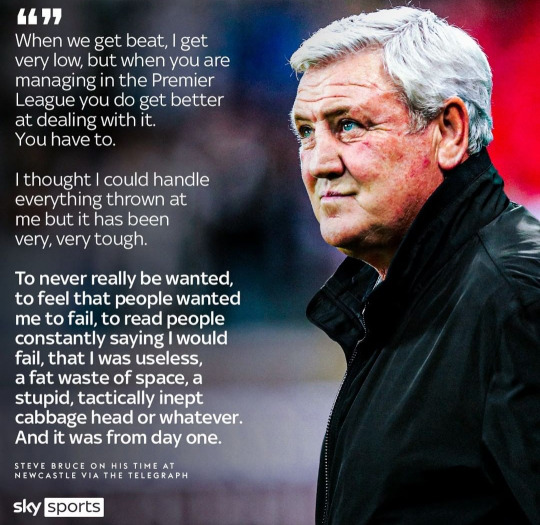
This made me sad ☹️
#nobody deserves abuse#people focus so much on racist abuse which is obviously important#but all abuse should be reported and punished#steve bruce
3 notes
·
View notes
Note
(pt 1) i really enjoy all your atla analyses & you've done a great job breaking down the usual arguments re how eip shows that kataang shouldn't have happened. i'm curious about your take on one specific argument that i just saw today, in an analysis of the show by a zker that was otherwise quite good and respectful (i know you've already talked about eip a lot, so no problem if you don't feel like rehashing). the premise: aang didn't just pressure katara in eip, he threatened her.
(pt 2) they point to when katara joins aang & asks if he’s alright: “aang: no, i’m not! i hate this play! katara: i know it’s upsetting, but it sounds like you’re overreacting. aang: overreacting? if i hadn’t blocked my chakra, i’d probably be in the avatar state right now!” the suggestion is he’s threatening her when he says ‘i’d probably be in the avatar state right now’ to describe his anger. i think this take exaggerates and oversimplifies it, but interested in your thoughts on it.
Hello my friend!! It is true I am Old inside and don’t like rehashing dhdlksjslks BUT your comments on my posts are always incredibly kind and insightful so I am more than willing to do a bit of rehashing for you 🥰 Besides! I’ve seen this general take before a few times and it’s always irked me for the exact reason you point out - it simultaneously exaggerates and oversimplifies the situation (and honestly that’s an impressive duality since it’s seemingly contradictory, so hats off to them lmaooo) - and now is as good a time as any to address it. So, for starters, let’s go ahead and get the excerpt they love to focus on so much:
Cut to Aang standing alone on a balcony. Katara enters and walks up to him.
Katara: Are you all right?
Aang: [Angered.] No, I’m not! I hate this play! [Yanks his hat off and throws it on the ground.]
Katara: I know it’s upsetting, but it sounds like you’re overreacting.
Aang: Overreacting? If I hadn’t blocked my chakra, I’d probably be in the Avatar State right now!
Here’s the thing about so-called analyses of this excerpt: in a manner extremely convenient to the poster, they never seek to contextualize this moment. (I mean, to do so would deplatform their entire “argument” - perhaps that’s why they avoid performing a full analysis?) So let’s avoid that pitfall from the start.
Firstly, below are some links to related posts; I’m going to do my best to summarize the most relevant parts, but for anyone who desires greater detail, I gotchu 😤
This post explains why EIP (the play, lol) is imperialist propaganda and is intended to belittle the entire Gaang.
This post explains how Aang never acted “entitled” to Katara’s affections, particularly in regard to EIP.
This post breaks down the infamous EIP kiss like Snopes Fact Checker, covering common misconceptions, important perspectives to consider, etc.
Alright. With that out the way, it’s time for some context.
Aang and Katara have this conversation on the balcony after watching 95% of “The Boy in the Iceberg,” a play chock-full of Fire Nation propaganda that demeans the entire Gaang in order to prop up the Fire Nation as superior (hence why the play ends with Ozai’s victory). Here is my general breakdown of Aang and Katara’s treatment in particular from a previous post:
- katara, an indigenous woman, is highly sexualized and portrayed as overly dramatic and tearful, because the fire nation objectifies women not of their own people and views them as less intelligent and less emotionally stable
- aang, the avatar, the sole survivor of the fire nation’s genocide of the air nomads who is incredibly in-touch with his spirituality and femininity, is portrayed as an overly-airy and immature woman. the fire nation portrays him with a female actor to demean him (like, that’s classic imperialistic propagandist tactics) and furthermore writing his character as a childish airhead reinforces the fire nation sentiment that the air nomads were weak, foolish people who did not deserve to exist in their world
In other words, these kids have just watched almost an entire play that preys upon their insecurities and depicts them using racist and sexist stereotypes about their respective nations. It is completely understandable that tensions might run a little high and that their interactions would not be as balanced as usual (Katara and Aang have a great track record of communicating well with each other, as it happens!).
So we have to keep that in mind when examining the aforementioned excerpt. But there are other factors to consider, too! Namely: they are kids. Children. Teens. Aang is 12, Katara is 14.
If we want to be scientific, a person’s brain doesn’t finish developing until they are 25, lmao, and the preteen/teen years are when the prefrontal cortex that controls “rationality,” “judgement,” “forethought,” etc. is still developing. This doesn’t mean Aang and Katara are irrational and make poor decisions 24/7 (obviously not), but it does mean that in an intense, highly emotional situation, like after watching a play that intentionally demeans them and depicts them as inferior, they are more likely to overreact, more likely to be emotional, and more likely to make mistakes. Like, I’m serious, lol. “Teens process information with the amygdala.” That’s part of the brain that helps control emotions! It’s why teens sometimes struggle to articulate what we’re thinking, especially in situations that require instinct/impulse and quick decisions, because we’re really feeling whenever we make those choices. Acting more on emotion. Our brains simply haven’t finished developing the decision-making parts, lmao.
In sum: Aang and Katara are both kids, not adults, and should be interpreted as such. This doesn’t negate their intelligence, because they are both incredibly smart and Aang is arguably the wisest of the Gaang, but they are human. Young humans. They have emotions, and we should not be so cruel as to assume they’d never act on them.
So taking that all together, we can now acknowledge the high stress Aang and Katara are under, understand why they might be upset (*cough* imperialist propaganda is hurtful *cough*), and examine how their youth might play into their emotional reactions. And funny thing - all analyses that come to the conclusion of Aang “threatening” Katara here do not usually bother with this context. I can’t imagine why!
And you know what, let’s add one more piece of context: Sokka states that Aang left the theater “like, ten minutes ago,” which is what cues Katara to go look for him on the balcony. The reason I mention this line is because to me, it suggests Aang knew he was more worked up than usual! He chose to separate himself from his friends so he could process his frustration! He did not take his anger at the play out on them; instead, he purposefully took time and space to be alone.
With that in mind, I don’t understand at all how Aang’s Avatar state quote could be interpreted as a threat? Canonly, Aang is someone who was aware enough of his frustration to separate himself from the others - yet the logical next step is him threatening Katara as a result? He knew his intense emotions were because of the play (which he says himself), so the logical conclusion is that he then pinned the fault on Katara? What?? Sorry, that interpretation has no textual basis, lmao. But I digress!
Aang tells Katara, “If I hadn’t blocked my chakra, I’d probably be in the Avatar State right now!” As you said, this is the line people point to in an attempt to justify their (baseless) conclusion that Aang is “threatening” Katara. So let’s bring in the two key pieces of context: imperialist propaganda and age. Given that Aang is 12, and given that Aang has just watched almost a full play that demeans him and everything his people stood for (and let’s not forget it also mocks his and Katara’s love for each other)…
His reaction is understandable. An exaggeration and needlessly dramatic, but understandable. He feels vulnerable and insecure and Aang is human. He is human and flawed and he overreacts here and I love that A:TLA shows how even our heroes, even people who are truly good at heart and in soul, can get overly upset (especially given the aforementioned circumstances!). Would Aang actually be in the Avatar state at that moment, had it been possible? Of course not! He’s young and he’s hurt and as such he says something dramatic to convey his anxieties and frustrations. The line is not meant to be taken literally, and seeing people do so despite all the factors that should be taken into consideration when analyzing it… Cue a long, tired sigh from me and so many other A:TLA fans.
And to be honest? I cannot fathom how people watch this episode and come to the conclusion that Aang is “threatening” Katara. To me, this episode - besides being a recap episode - is one that humanizes our cast even further. Aang snaps at Katara, kisses her when he shouldn’t (which the story appropriately treats as wrong). Katara pushes down her true feelings and retreats into herself, afraid to start a relationship with the boy she loves because she’s already lost him once before and can’t bear to do so again. Zuko further confronts the hurt he’s enacted upon others, especially upon Iroh. Toph practices being vulnerable and accepting vulnerability from others by conversing with Zuko. Sokka witnesses how others have erased his contributions and labelled him as nothing more than the token nonbender in the group. Even Suki learns that she is not the only person who holds a place in Sokka’s heart and that she can never replace what he has lost.
To watch this episode where our heroes must come to terms with how the Fire Nation deems them inherently inferior, with how they have more fights to overcome in the future with the Fire Nation than a single war, and to come to the conclusion that… that what, Aang is abusive? A monster? Irredeemable? That he would threaten his best friend, someone he loves in every way?
Wow. That says more than enough about the viewer, doesn’t it?
#getting back into the swing of things babey ✌️#aang#katara#kataang#kataangtag#the ember island players#atla#avatar the last airbender#amy answers#dramaticowl#amy analyzes#also i am speaking in GENERAL TERMS here lmaooo this is not a direct response to any one post 😂😂
111 notes
·
View notes
Text
Coping with religious trauma
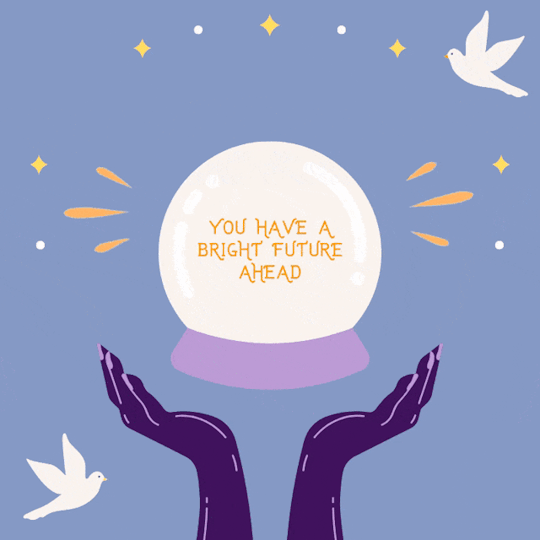
CONTENT WARNING: THIS POST CONTAINS DISCUSSIONS OF MENTAL ILLNESS, TRAUMA RECOVERY, AND HOMOPHOBIA. The advice in this post is intended for an adult audience, not for those who are legal minors.
A lot of people find their way to paganism after having traumatic experiences with organized religion, especially in countries like the United States, where 65% of the population identifies as Christian. (This number is actually at an all-time low — historically, the percentage has been much higher.) Paganism, which is necessarily less dogmatic and hierarchical than the Abrahamic religions, offers a chance to experience religion without having to fit a certain mold. This can be extremely liberating for people who have felt hurt, abused, or ignored by mainstream religion.
To avoid making generalizations that might offend people, I’ll share my own story as an example.
My family joined the Church of Jesus Christ of Latter Day Saints, better known as the Mormons, when I was nine years old. The Mormons are an extremely conservative sect of evangelical Christianity that places a heavy emphasis on maintaining a strong community that upholds their religious values. The problem with that is that Mormon values are inherently racist, sexist, homophobic, and transphobic. As a teenager in the Mormon Church, I was told that as a woman, my only purpose in life was to marry a (Mormon) man and raise (Mormon) children. I was discouraged from pursuing a college education if it meant delaying marriage. I was not allowed to participate in the full extent of religious ritual because I was not a man. I was not allowed to express myself in ways that went against Mormon culture, and I kept my bisexuality secret for fear I would be ostracized. I didn’t have any sort of support system outside the Church, which inevitably made the mental health issues that come with being a queer woman in a conservative Christian setting much, much worse.
I left the Mormons when I was seventeen, and by that time I had some major issues stemming from my time in the Church. I had been extremely depressed and anxious for most of my teen years. I struggled with internalized misogyny and homophobia. I had very low self-esteem. I had anxiety around sex and sexuality that would take years of therapy and self-work to overcome. I wanted to form a connection with the divine, but I wasn’t sure if I was worthy of such a connection.
I was attracted to paganism, specifically Wicca, because it seemed like everything Mormonism wasn’t. Wicca teaches equality between men and women, with a heavy focus on the Goddess in worship. It places an emphasis on doing what is right for you, as long as it doesn’t harm anyone else. It encourages sexuality and healthy sexual expression. Learning about Wicca, and later other types of paganism, helped me develop the kind of healthy spirituality I’d never experienced as a Mormon. Although Wicca is no longer the backbone of my religious practice, it was a necessary and deeply healing step on my spiritual journey.
I’m not sharing my story to gain sympathy or to make anyone feel bad — I’m sharing it because my situation is not an uncommon one in pagan circles. The vast majority of pagans are converts, meaning they didn’t grow up pagan. Some had healthy upbringings in other faiths, or no faith at all, and simply found that paganism was a better fit for them. Others, like myself, had deeply traumatic experiences with organized religion and are attracted to paganism because of the freedom, autonomy, and empowerment it offers.
If you fall into this latter category, this post is for you. Untangling the threads of religious trauma can be an extremely difficult and overwhelming task. In this post, I lay out six steps to recovery based on my own experiences and those of other people, both pagan and non-pagan, who have lived through religious trauma.
While following these steps will help jumpstart your spiritual healing, it’s important to remember that healing is not a linear process — especially healing from emotional, mental, and spiritual trauma. You may have relapses, you may feel like you’re moving in circles, and you may still have bad days in five or ten years. That’s okay. That’s part of the healing process. Go easy on yourself, and let your journey unfold naturally.

Step One: Cut all ties with the group that caused your trauma
Or, at least, cut as many ties as reasonably possible.
Obviously, if you’re still participating in a religious organization that has caused you pain, the first step is to leave! But before you do, make sure you have an exit plan to help you disengage safely and gracefully.
To make your exit plan, start by asking yourself what the best, worst, and most likely case scenarios are, and be honest in your answers. Obviously, the best case scenario is that you leave, everyone accepts it, and all is well. The worst case scenario is that someone tries to prevent you from leaving — you may be harassed by missionaries or concerned churchgoers, for example. But what is the most likely case scenario? That depends on the religious community, their beliefs, and how involved you were in the first place. When making your exit plan, prepare for the most likely scenario, but have a backup plan in case the worst case scenario happens.
Once you’ve prepared yourself for the best, worst, and most likely outcomes, choose a friend, significant other, or family member who can help you make your exit. Ideally, this person is not a member of the group you are trying to leave. Their role is mainly to provide emotional support, although they may also need to be willing to run off any well-meaning missionaries who come calling. This person can also help you transition after you leave. For example, you might make a plan to get coffee with them every week during the time your old religious community holds worship services.
Finally, make your strategy for leaving. Choose a date and don’t put it off! If you have any responsibilities within the group, send in a letter of resignation. Figure out who you’ll need to have conversations with about your leaving — this will likely include any family members or close friends who are still part of the group. Schedule those conversations. Make sure to have them in public places, where people will be less likely to make a scene.
If you feel it is necessary, you may want to request that your name be removed from the group’s membership records so you don’t get emails, phone calls, or friendly visits from them in the future. You may not feel the need to do this, but if contact with the group triggers a mental health crisis, this extra step will help keep you safe.
Of course, it’s not always possible to completely cut ties with a group after leaving. You may have family members, a significant other, or close friends who are still members. If this is the case, you’ll need to establish some clear boundaries. Politely but firmly tell them that, although you’re glad their faith adds value to their lives, you are not willing to be involved in their religious activities. Let them know that this is what is best for your mental and emotional health and that you still value your relationship with them.
Try to make compromises that allow you to preserve the relationship without exposing you to a traumatic religious environment. For example, if your family is Christian and always spends all day on Christmas at church, offer to celebrate with them the day after, once their religious commitments are over.
Hopefully, your loved ones can respect these boundaries. If not, you may need to distance yourself or walk away altogether. If they are knowingly undermining your attempts to take care of yourself, they don’t deserve to be in your life.
During this time, you may find it helpful to read other people’s exit stories online or in books. One of my personal favorites is the book Girl at the End of the World by Elizabeth Esther. Hearing other people’s stories can help you remember that other people have been through similar situations and made it out on the other side. You will too.

Step Two: Seek professional help
I cannot overstate the importance of professional counseling when dealing with trauma of any kind, including religious trauma. Therapists and counselors have the benefit of professional training. They are able to be objective, since they’re approaching the situation from the outside. They can keep you from getting bogged down in your own thoughts and feelings.
I understand that not everyone has access to therapy. I am very lucky to have insurance that covers mental health counseling, but I know not everyone has that privilege. However, there are some options that make therapy more affordable.
There may be an organization in your area that offers free or low-cost therapy — if you live in the U.S., you can find information about these services by checking the National Alliance on Mental Illness (NAMI) HelpLine or visiting mentalhealth.gov. You can also look for therapists who use a sliding scale for payment, which means they determine an hourly rate based on the client’s income. And finally, if you have a little bit of extra cash you may want to look into therapy apps like BetterHelp or Talkspace, which are typically cheaper than in-person therapy.
If none of those options work for you, the next best option is to join a support group. Support groups allow you to connect with other people whose experiences are similar to yours and, unlike therapy, they allow you to get advice and feedback from multiple people. These groups are often free, although some charge a small fee.
Finding the right group for you is important. You’re unlikely to find a group for people recovering from religious trauma but, depending on the nature of your trauma, you may fit right in with a grief and loss group, an addiction recovery group, or a group for adult survivors of child abuse. If you’re a member of the LGBTQ+ community, you may be able to find a queer support group. (The LGBTQ+ club at my college was an invaluable resource in my recovery!) Depending on your area, you may also be able to find groups for specific mental and emotional issues like depression or anxiety.
Make sure to do your research before attending a meeting. Find out what, if anything, the group charges, who can join, and whether they use a curriculum or have unstructured sessions. See if you can find a statement about their values and philosophy. Make a note of where meetings are held and of who is running the group. Some support groups meet in churches and may or may not have a religious element to their curriculum. It’s best to avoid religious groups — the last thing you need right now is to be preached to.
Getting other people involved in your recovery will make you feel less alone and prevent you from getting stuck in your own head. A good therapist, counselor, or support group can help you realize what you need to work on and give you ideas for how to approach it.

Step Three: Deprogramming
“Deprogramming” refers to the practice of undoing brainwashing and reintroducing healthy thought patterns. This term is normally used in the context of cult survivors and their recovery, but deprogramming techniques can also be helpful for people recovering from a lifetime of toxic religious rhetoric.
To begin the process of deprogramming, familiarize yourself with the way organizations use thought control to shape the behavior of their members. I recommend starting with the work of Steven Hassan — his BITE model is a handy way to classify types of thought control.
The BITE model lays out four types of control. There’s Behavior Control, which controls what members do and how they spend their free time. (For example, requiring members to attend multiple hours-long meetings each week.) There’s Information Control, which restricts members’ access to information. (For example, denying certain aspects of the group’s history.) There’s Thought Control, which shapes the way members think. (For example, classifying certain thoughts as sinful or dirty.) And finally there’s Emotional Control, which manipulates members’ emotions. (For example, instilling fear of damnation or punishment.)
Here’s a simple exercise to get you started with your deprogramming. Divide a blank sheet of paper into four equal sections. Label one section “Behavior,” one “Information,” one “Thought,” and one “Emotions.” Now, in each section, make a list of the ways your old religious group controlled — and maybe still controls — that area of your life. Once you’ve completed your lists, choose a single item from one of your lists to work on undoing.
For example, let’s say that in your “Information” column, you’ve written that you were discouraged from reading certain books because they contained “evil” ideas. (For a lot of people, this was Harry Potter. For me, it was The Golden Compass.) Pick up one of those books, and read it or listen to it as an audiobook. Once you’ve read it, write down your thoughts. Did you enjoy it? Why or why not? Why do you think your group banned it? What was in this book that they didn’t want you to know about? Write it down.
Once you’ve worked on the first thing, choose something else. Keep going until you’ve undone all the items on your lists.
If you want to go further with deprogramming, I recommend the book Recovering Agency by Luna Lindsey. Although this book is specifically written for former Mormons, I genuinely believe it would be helpful to former members of other controlling religious groups as well. Lindsey does an excellent job of explaining how thought control works and of connecting it to real world examples, as well as deconstructing those ideas. Her book has been a huge help in my recovery process, and I highly recommend it.
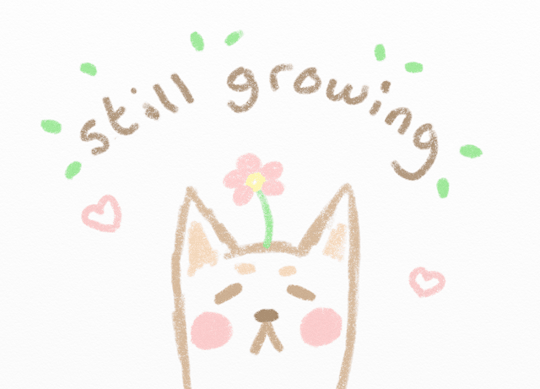
Step Four: Replace toxic beliefs and practices with healthy ones
This goes hand-in-hand with step three, and if you’re already working on deprogramming then you’ll already have started replacing your unhealthy beliefs. This is the turning point in the recovery process. You’re no longer just undoing what others have done to you — now you get an opportunity to decide what you want to believe and do going forward. This is the time to let go of things like denial of your desires, fear of divine punishment, and holding yourself to unattainable standards. Get used to living in a way that makes you happy, without guilt.
Notice how each step builds on the previous steps. Therapy and deprogramming can help you identify what beliefs and behaviors need to be adjusted or replaced. Your therapist, support group, and/or emotional support person can help you make these changes and follow through on them.
These new beliefs and practices don’t have to be religious — in fact, it’s better if they aren’t. If you can live a healthy, happy, balanced life without religion, you’ll be in a better position to choose a religion that is the right fit for you, if that is something you want.
Your new healthy, non-religious practices may include: mindfulness meditation, nature walks, journaling, reading, exercise, energy work, learning a hobby or craft, or spending time with loves ones — or it might include none of these things, and that’s okay too. Now is the time to find what brings you joy and start doing it every day.
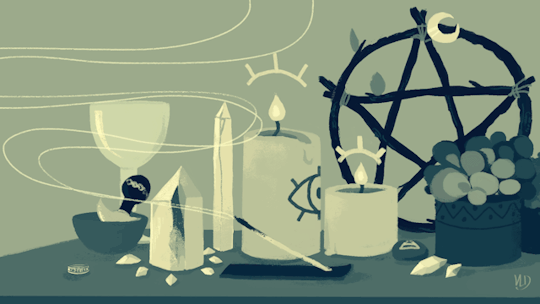
Step Five: Ritual healing
This is an optional step, but it’s one that has been deeply healing for me. You may find it helpful to design and perform a ritual to mark your recovery.
Note that when I say “ritual,” I don’t necessarily mean magic. Rituals serve a psychological purpose as well as a spiritual one. They can act as powerful symbolic events that mark a turning point in our lives or reinforce what we already know and believe. Even if you don’t believe in magic, even if you’re the least spiritual person you know, you can still benefit from ritual.
You might choose to perform a ritual to finalize your healing, or to symbolically throw off the chains of your old religion. It can be elaborate or simple, long or short, joyful or solemn. It might include lighting a candle and saying a few words. It might include ecstatic dance. It might include drawing or painting a representation of all the negative emotions associated with your old religion, then ritually destroying it. The possibilities are literally endless. (If you’re looking for ritual ideas, I recommend the book Light Magic for Dark Times by Lisa Marie Basile.)
One type of ritual that some people find very empowering is unbaptism. An unbaptism is exactly what it sounds like — the opposite of a baptism. The idea is that, if a baptism makes a Christian, an unbaptism makes someone un-Christian, no longer part of that lineage. It is a ritual rejection of Christianity. (Obviously, this only applies if you’re a former Christian, though some of the following suggestions could be adjusted to fit a rejection of other religions.)
If you’re interested in unbaptism, here are some ideas for how it could be done:
A classic method of unbaptism is to recite the Lord’s Prayer backwards under a full moon. (For a non-Christians version, use a significant prayer from whatever religion you have left.)
Run a bath. Add a tiny pinch of sulfur (a.k.a. brimstone) to the water. Get into the bath and say, “By water I was baptized, and by water my baptism is rejected.” Submerge your entire body under the water for several seconds. When you come back up, your unbaptism is complete. (You may want to shower after this one. Sulfur does not smell good.)
The Detroit Satanic Temple has a delightfully dramatic unbaptism ritual. For a DIY version, you will need holy water or some other relic from the faith you were baptized in, a fireproof dish, a black candle, and an apple or other sweet fruit. Light the candle and place it in your fireproof dish. Toss some holy water onto the flame (not enough to extinguish it) and say, “I cast my chains into the dust of hell.” Take a bite of the apple and say, “I savor the fruit of knowledge and disobedience.” Finally, declare proudly, “I am unbaptized.” You can add “in the name of Satan” at the end or leave it out, depending on your comfort level.
Personally, I’ve never felt the need to unbaptize myself. I’ve ritually rejected my Mormon upbringing in other ways. Maybe someday I’ll decide to go for the unbaptism, but I’ve never really felt like I needed it. Likewise, you’ll need to decide for yourself what ritual(s) will work for you.

Step Six: Honor your recovery
Our first reaction to trauma is to hide it away and never speak of it again. When we do this, we do ourselves a disservice. Your recovery is a part of your life story. You had the strength to walk away from a situation that was hurting you, and that deserves to be celebrated! Be proud of yourself for how far you’ve come!
You may choose to honor your recovery by celebrating an important date every year, like the day you decided to leave the group, the date of the last meeting you attended, or the date you were removed from the membership records. Keep this celebration fun and light — get drinks with friends, bake a cake for yourself, or just take a few moments to silently acknowledge your journey.
If you feel like having a party is a bit much, you can also honor your recovery by talking to other people about your experiences. Share your story with others. If you’re feeling shy, try sharing your story anonymously online. (Reddit has several forums specifically for anonymous stories.) You’ll be amazed by how validating it can be to tell people what you’ve been through. `
Another way to honor your recovery is to work for personal and religious freedom for all people. Protest laws with religious motivations. Donate to organizations that campaign for the separation of church and state. Educate people about how to recognize an unhealthy religious organization. Let your own story motivate you to help others who are in similar situations.
And most of all, take joy in your journey. Be proud of yourself for how far you’ve come, but know that your recovery is a lifelong journey. Be gentle and understanding with yourself. You are doing what is right for you, and no god or spirit worthy of worship could ever be upset by that.
#this is long but i wanted it to be as helpful as possible#so there#paganism 101#pagan#paganism#pagan witch#wicca#wiccan#feri#reclaiming#goddess worship#celtic paganism#irish paganism#hellenismos#hellenic polytheism#hellenic paganism#religio romana#roman polytheism#heathenry#heathen#norse paganism#kemetic polytheism#kemetic paganism#eclectic pagan#baby witch#baby pagan#witchblr#exmo#exmormon#apostake
283 notes
·
View notes
Text
one of the most impactful things I have read lately are two of French author Edouard Louis' books, Pour en finir avec Eddy Bellegueule and Qui a tué mon père (translated into English as The End of Eddy and Who Killed my Father). It's been two months and I'm still thinking about it.
The first book is an 'autobiographical novel' about the author's childhood growing up as an obviously gay boy in one of the poorest areas of France, until he leaves and reinvents himself as a writer. It's fraught with bigotry, abuse, bullying, violence, deprivation and social despair, and it's one of the most harrowing things I have ever read. It reads as many things as once : a recognition of trauma, an angry exorcism, a cry for society at large to pay attention, and to be honest, as a horror story.
It was criticized by some in France as portraying the working class in a manner that was too negative, which tells me they missed the point entirely...ironic for a book by someone who actually grew up poor - one of my least favorite things ever is progressives telling a marginalized person they can't talk about their own experiences because they don't fit the desired mold. (The French love to romanticize the working class and I'm pretty sure it's often an avoidance mechanism.)
The point of the book is so obviously not about 'look at how terrible and bigoted those poor people are'. Little Eddy spends a big part of the narrative trying to escape - himself at first, then his family/circumstances and the persistent homophobia everywhere. In the end of the book, he finally manages to get accepted into a fancy high school in the city on a scholarship and tries really hard to fit in. The last scene of the book is a bunch of his - educated, upper/middle class - classmates throwing homophobic taunts at him, starting the cycle anew. I can't think of a clearer way to say 'this is not a story about a sad gay boy escaping the evil bigoted countryside for the city and then everything was wonderful!!!! this is a story about a systemic, pervasive problem.'
One of the key arguments of the book, to me, is how homophobia, sexism and bigotry in general are both a product and a reproduction mechanism of social and economic exclusion. For instance, he describes how the norms around what it means to be a man in his village (being tough, disobeying authority, quitting school early to go work at the factory, drinking alcohol, neglecting your own health, fighting over women, repressing your feelings, etc) perpetuates the cycle of poverty ; but again this isn't 'oh these people are so stupid' and more 'these people are trapped'. Because he makes it evident how degrading and dehumanizing poverty can be, this masculinity reads as a desperate attempt to cling to a certain amount of dignity - it's an extremely dysfunctional coping mechanism. At the same time, anyone falling outside of the mold is violently ostracized (like Eddy, who tries and fails to fit in). So the system keeps reproducing itself.
In Who Killed my Father, the author makes his political argument clearer. This is more of an essay, centering on his father, arguably the most complex figure in the first novel. The man is an angry, bigoted alcoholic who makes his family miserable ; at the same time he is the son of an abusive father who makes a point of honor to never hit his kids or wife even though it's very normalized in this context. In this essay the author keeps talking about the moments of almost tenderness with his father that haunt him, the picture he has of him doing drag in his youth, the fact that the father tried to leave the village when he was young to find a better life for himself with a close friend but failed and had to come back - the moments of what-ifs, of trying to struggle free from the cycle, when the system appears almost fragile and not so unbreakable after all, that the son kept holding close like a sort of talisman.
The narrative is structured around the fact that his father injured his back working in a factory and that he had to keep doing physical labor afterwards for money, instead of resting to recover, until it completely destroyed his body. Now he finds himself bed-bound at 53. Louis inquires into who is responsible for this premature 'death'. After considering individual choices, he turns towards political decisions - the successive governments, left and right, who have been destroying the French welfare system for decades and accelerating inequality. The point is to step out of the neoliberal obsession with personal responsibility and who is guilty and who is a bad or good person, and look at systems.
An element that isn't focused on but hovers over the story constantly is that this village is one where the majority of the population consistently votes for the extreme right National Front party in most elections. The book is too angry and nuanced to be some stupid "it's not their fault that they're racist because they're poor!" argument. It doesn't make any excuses for how awful this is but instead illustrates how dehumanization replicates itself, how people being denied basic dignity leads to them wanting to deny it to others. If you want to really understand the rise of the far right you have to look at where the inequality comes from in the first place, and how easy it is for people in power to wash their hands of it by blaming the bigoted masses. (Just like you can blame societal ills on minorities ! Two for one strategy.)
Towards the end of the essay, the author talks about how proud his father is of his son's literary success - for a book who clearly depicts him as a horrible person ! And this is a man who has spent his life openly despising anything cultural, because it never showed him a life like his own. But maybe now he feels seen, now he knows people want to read about these things. Maybe there is a reclamation of dignity through looking at the horror head on. Maybe his son somehow slipping through the cracks of the cycle gives him more room. The man stops making racist comments, and instead asks his son about his boyfriend. Most importantly, he asks his son about the leftist politics he's engaged in. They talk about the need for a revolution.
I think what strikes me the most is this attitude of "wounded compassion" that permeates the book. What do you do when your parents are abusive but even after you grow up, you can't help but still love them, and you know they've been shaped by the system that surrounds them ? Recognizing, speaking the harm is essential. You need to find your own freedom, sense of worth, and safety. You need to dissect the mechanisms at hand so they lose at least some of their power over you. You need to find people who love and believe you. But then what? Do you dismiss your persistent feelings of affection and care for those who hurt you as a sign you're just fucked up in the head ? You could just decide to never speak to them again, and it would be justified, but is that really what is going to heal you the most? It's important to realize you have the choice. But there are no easy conclusions.
This makes me think of a passage I have just read in Aversive Democracy by Aletta Norval. The essential ethos of radical democracy, she says, is about taking responsibility for your society, even the bad parts, instead of seeing them as a foreign element you have to cleanse yourself of. It's too fucking easy for queer progressives, especially the middle class urban kind, to talk about dumb evil hicks, to turn pride into a simple morality tale, and forget that any politics that don't center the basic dignity and needs of people are just shit. The injury is to you and by you and you have a duty of care just as much as a duty of criticism. (And this is obviously not only applicable to class matters.) You can't just walk away and save your sense of moral purity. (This is not an argument that the oppressed are responsible for educating the oppressors ; it's about how privilege is not an easy simple ranking and it is too damn easy to only focus on the ways in which you are oppressed and forget the ways in which you may have more leeway.)
There is no absolute equivalence between political and family dynamics but the parallel feel very relevant somehow. Several truths can coexist at once : you needed help and it was not given. You were let down. It's important to recognize that people are responsible of how they treat each other. You need to call out what isn't ok and stand up for yourself. At the same time, there is a reason why things are like this. Making people into villains is often bad strategy (within reason!), and in the end, easy dichotomies are often an instrument of power. The horrors you have been through might have given you a very specific wisdom and grace you do not have to be afraid of ; you are not tainted by your compassion (it is very much the opposite of forced forgiveness ; it has walked through the fire of truth.)
To me these books fit into what French literature does best, sociological storytelling a la Zola or Victor Hugo - the arguments aren't new and they can come across as heavy handed, even melodramatic. But I'll argue that the viscerality is the point, how the raw experience of misery punches through any clever arguments about how exploitation persists for the greater good of society. Really worth reading if you can do so with nuance.
#edouard louis#french literature#france#queer culture#queer literature#lgbt books#bookblr#also just like the first book is a walking trigger warning in every possible direction so like careful#also the dude is literary buddies with ocean vuong and im curious to see if there are any parallels there#long post#poli sci
57 notes
·
View notes
Text
RWBY Recaps: Volume 8 “Midnight”
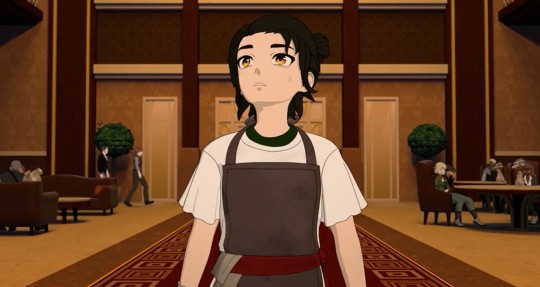
Happy Saturday, everyone! I’d like to extend a formal congratulations to every Cinder fan in the community. Criticisms of the writing aside, you all struck gold with twelve whole minutes devoted to your fave and I’m absolutely thrilled for you.
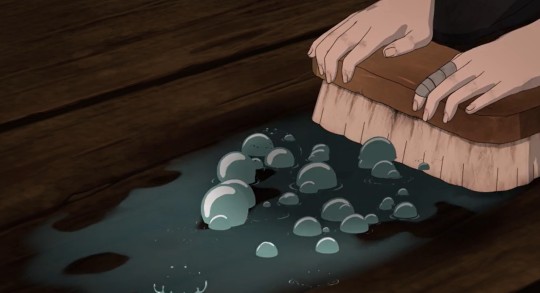
We again start with a dark screen and some audio, in this case Cinder’s scrubbing. This technique—along with closeups on eyes—is a real favorite of RWBY’s this volume, to the point where I think they’re a little too enamored with it. But at least this is just a preference, not something that actively harms the storytelling in any way, so it’s welcome to stay. This time, unlike our premiere, we stay on Cinder as her life is summed up with three events intercut with one another: scrubbing floors, getting taunted by boys, and the sound of heels making their way towards her. It’s clear that Cinder leads a poor, miserable life, if her dirty clothes and stronger guys throwing her around is any indication, but all that changes when the rich woman says “I’ll take her” and Cinder is transported to a better life in a wealthy hotel.
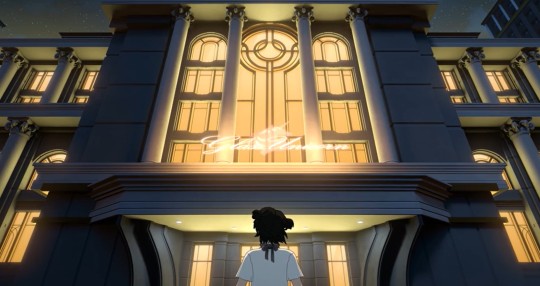
At least supposedly.
Here’s my problem with the worldbuilding. This moment has Witcher vibes and Witcher, in turn, built itself off of a trope seen a hundred times before: A young woman is treated terribly by her family, is whisked away by a wealthy/powerful caretaker, and though her life has arguably improved, she quickly learns that the new world she’s entered is just as dangerous and harsh as the one she left. In Witcher’s case, Yennefer is a disabled woman abused by her family, bought by Tissaia, and taken to Aretuza where the other girls hate her and the curriculum is potentially deadly. Cinder is a poor woman arguably abused by her family (scrubbing)/the locals (fights), is taken by an unnamed woman, and whisked away to the swanky hotel where the daughters hate her and the work is potentially deadly due to shock collars. The difference between these two setups is that Tissaia bought Yennefer because of her magical potential. Why does our hotel lady take Cinder?
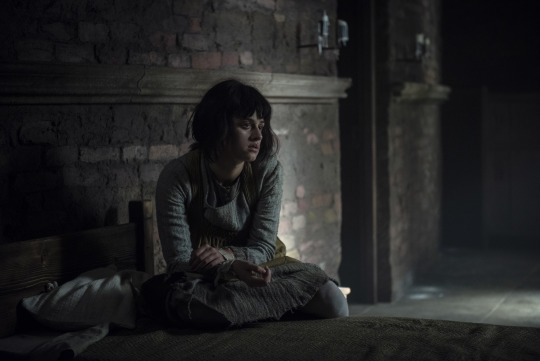
I mean yeah, obviously she wants a slave, but it’s a little weird isn’t it? Usually when a young woman falls headfirst into a new and questionable life, there’s a solid reason for her entry. This woman—whose lack of a name also says something about the worldbuilding—could have hired anyone she pleased to abuse. As we saw in regards to Atlas and Mantle in the past, every city has its poor and downtrodden. So what made her go out to some random farm and snatch Cinder up? It just, as always, feels a little too convenient. Cinder didn’t enter this life because something about her characterization or origin justified it, the plot simply ensured that she, out of everyone possible, and with very little reason, was the one chosen to follow The Plot™ .
It also messes with the Cinderella parallels. Originally (or “originally,” going off of Disney here which is likely what RWBY is using as a template too) it’s her step-family that abuses her and yes, we recreate that via the hiring (“hiring”—I doubt she was paid), but Cinder was already scrubbing floors back home. Her status as the servant already existed. So why change locations? Why not just keep Cinder as an abused farm girl, or have her a part of the hotel family right from the start? Part of the reason why Cinderella resonates is because of the contrast between the happy life with her father and the new, horrific life she falls into once he dies. Which is then further contrasted by the rest of the outside world. Fairy Godmother, Prince, and party-goers alike are all presented as kind, decent people. They represent the “real” world that Cinderella can escape to. By making Cinder’s original life horrible, her new life worse, and everyone connected with that life cruel and/or indifferent (with the exception of this one, special huntsmen)… you paint a very different picture of the world as a whole. Which is something RWBY has been vocal about trying to accomplish—it’s not a fairy tale—the only problem is with how these moments are undermined the second the story wants Ruby to ~Believe in People~. Cinderella is a story about enduring and eventually overcoming temporary hardship. Cinder’s story is about endless hardship that creates villains. A dark and fascinating story… but how does that fit into last week’s episode where Ruby told the whole world about Salem, expecting them to band together in peace and harmony? This is how Remnant’s world treats people when there’s not a global crisis, and Cinder isn’t even a faunus.
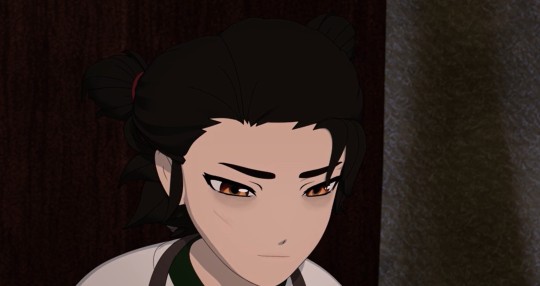
Which, I want to make clear going into the rest of this recap, does not excuse Cinder for her actions. At all. I think there are some complicated acknowledgements to be made in terms of her abuse and the Huntsmen’s responsibility in it continuing, but that does not give Cinder a blanket pass for all the horrific shit she has pulled over the years. Cinder didn’t just defend herself from abusers, she became one. More on that in a minute.
First though… is the Huntsmen’s name Rhodes? Did we hear that in the episode? If we did, I totally missed it because I have a note here about the one important character not getting a name. So yeah, idk. If we got this from more supplemental info, bad RWBY. If I missed it, bad Clyde. Either way, I’ll use that name going forward.
Back to the plot at hand. The hotel is, as said, populated by indifferent and shallow people and there’s no desert nearby, so I presume we’re supposed to be in Atlas? (Why did this woman buy a girl from another Kingdom?) There are customers getting drunk, flirting, and generally just enjoying their wealth, which harkens back to Weiss’ comment in Volume 4 about all their problems being superficial. We’re introduced to the owner’s two daughters who are, as expected, quintessential Mean Girls.
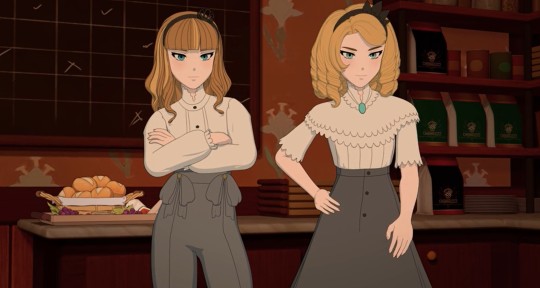
They love ordering Cinder around, not just with hotel chores, but personal ones as well like, “rub my feet”… despite the fact that this place is massive and must have an equally massive staff to stay in business. Why aren’t the girls terrorizing anyone else? Again, it makes sense for Cinder(ella) to be the focus of their abuse when she’s in a single household, but transplanting that to a hotel raises a lot of questions that RWBY hasn’t bothered to examine. You can’t move a story like that and not think about what further changes that would evoke.
See, RWBY could have done something interesting here by considering some of those other changes. Like having one or both step-sisters be the one to help free Cinder from her abuse, playing the villain before becoming the fairy godmother. Up until she turns villain instead of hero, this is just Cinderella’s story copy and pasted into RWBY. It’s moments like this that should make us wary of using fairy tale allusions as evidence for our readings and theories. Whether RWBY is deconstructing or upholding a story varies wildly, and we never know what we’ll get until we actually see it on screen. Even then we can’t count on a choice remaining consistent, as we saw with Ironwood’s deconstruction being tossed out the window in Volume 7.
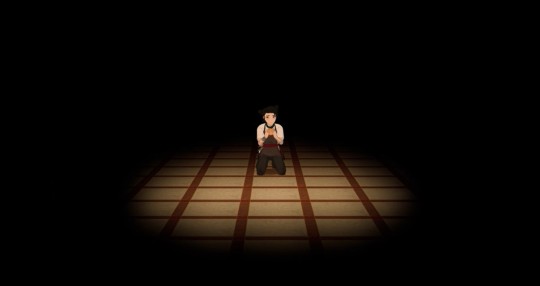
Cinder is originally just as meek as her fairy tale counterpart too. We don’t hear her speak until the owner is about to leave when she simply goes, “Food?” The sisters laugh at her and a roll is thrown to the floor with the comment that she should get busy because it “looks filthy.” I quite like that moment. Your job is to ensure the floors are clean enough to eat off of—literally.
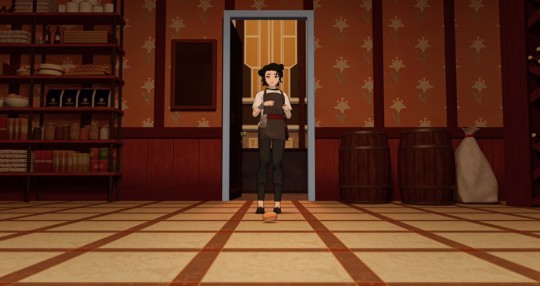
We see a montage of Cinder doing just that, lots of chores, with a new song listing all the tasks she’s now responsible for. During this, Rhodes is seen in the background and witnesses when Cinder (presumably) first uses her semblance by heating up the brush and chucking it at the sisters, creating a massive cloud of steam.
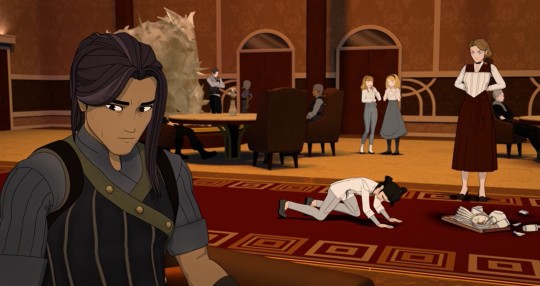
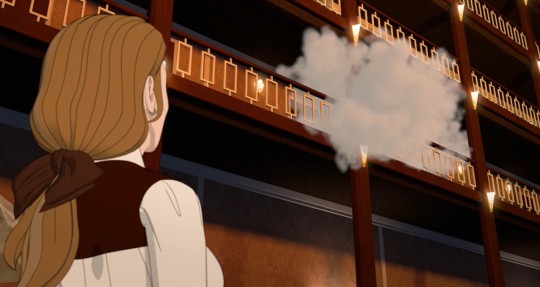
It’s that moment which “earns” her a shock session with her necklace and I’m staring at the screen, a little open-mouthed. I mean, that’s the second child torture we’ve seen this volume (with Cinder being ten here). Again, I’m not making a specific accusation, just going, “Really?”
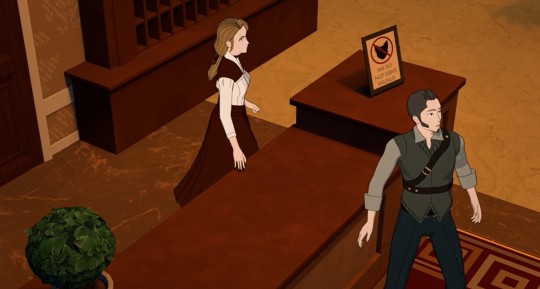
Also, note the anti-faunus sign. Nothing like continually showing us racist establishments rather than actually writing a story that deals with the racism needless put into the story world. I’d like to remind everyone of my previous comments this Volume about how the story works hard to paint Mantle as sympathetic, but refuses to show anything that does the same for Atlas citizens, people who are in just as much danger with Salem as an equalizer. A whole city is not actually made up of shallow racists, the show is just showing us only those people to create a simplistic “They’re all bad” reading that encourages us to reject Atlas and, by extension, Ironwood. Weiss is walking proof that Atlas citizens are both complex individuals and capable of bettering themselves. If we can come to adore the Schnee heiress, we should be questioning why nearly every other citizen is painted as an abuser, too wealthy to care, or has conveniently left the story (Rhodes dead, Klein gone, Whitley rejected, etc.).
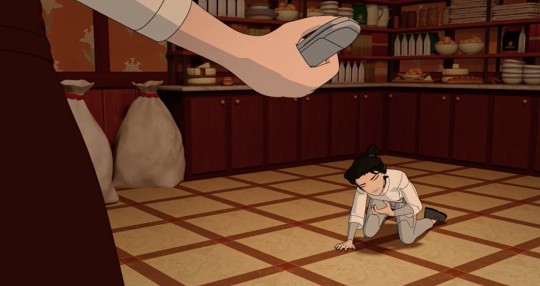
As Cinder is being tortured, we see that she’s forced to say, “Without you, I am nothing.” Now see, this is excellent... in theory. This is the kind of line we needed to hear with some consistency over the last seven years (if RWBY still insisted on waiting that long for a backstory), setting up that this line is clearly engrained in Cinder and she repeats it on instinct. Instead—to my recollection, anyway—we only get it this Volume, in two episodes. If it appeared before then it wasn’t notable enough to remember. I commented on this before, but it wasn’t a, “Ah, this line must be important” reaction, it was a “Lol why is RWBY using the same line twice? That’s weird.” By only giving it to us twice before the backstory and in such a short timeframe, the impact of this reveal is lost. We’re only now realizing that the line is important, rather than coming to realize why.
Our writers know just enough to recognize what techniques work, but not enough to have figured out what makes them tick. They get that providing a RWBY-vised version of Cinderella is cool, but not how to adapt that 100% successfully. They know that repeated lines have power, but not how to create good setup for the reveal. They know the camera should use closeups, but not what moments are important enough to warrant that. RWBY, eight years on, still feels like a newbie writer copying what the great stories are doing without yet understanding why those aspects work and, thus, how to recreate them.
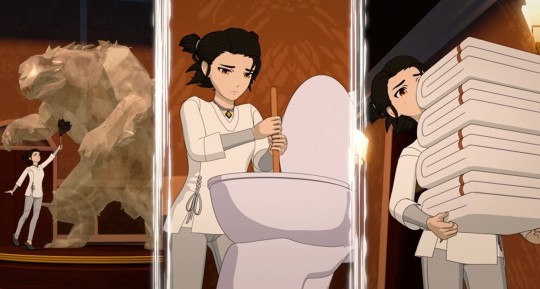
I mean, Cinder’s backstory appearing now attests to that most obviously. I waved at the Cinder fans before, but the reality is that most viewers don’t care, either because Cinder herself is so bland, and/or because the story waited too long to make her a little more interesting. This entire flashback was handled badly simply by virtue of it arriving over seven years past the character’s introduction.
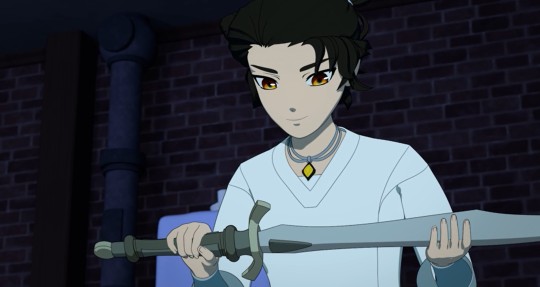
So after this torture session Cinder steals Rhode’s sword. We hear some dialogue in the background of him getting pissed that it’s missing and the sisters promising to find it, implying that Cinder will have this tool at her disposal for a while. Instead, seconds later he’s found her hideout and confronts her. I don’t know if I’m impressed with Rhode’s skills, or rolling my eyes at how contrived this all is. Chuck in the question of whether Cinder was talented enough to steal the sword out from under him, or if Rhodes was stupid enough to leave it lying around, and I’m edging towards the eye rolling.
He dodges Cinder’s attack, rolls her more weapons to prove he’s not here to hurt her, and acknowledges that she’s not getting “the most fair treatment.” Okay, here’s where things start to get complicated. Rhodes tells Cinder she shouldn’t run away because then she’ll be running her whole life (don’t really agree with that). He likewise (rightly imo) tells her not to straight up murder them because look, no matter how much of a shit stain someone is, I can’t condone slamming a sword through their chest on an individual’s say-so (especially when two of those people are also kids growing up under an abuser, like Whitely). So what’s left? Rhodes says Cinder can train to become a huntress. At ten years old, she has seven years to prepare for the exam.
But she has to stay with her abusive family until then.
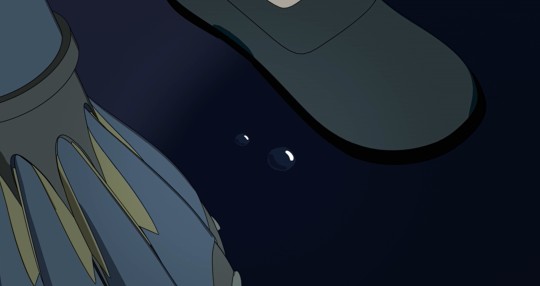
My problem is far less with the claim that this “has” to happen and far more with the writing’s failure to tell us why. Cinder could have begged to come with Rhodes and he says she can’t because… idk. Make up a reason. He doesn’t make enough to feed the both of them. It would be too dangerous out on missions without training and he doesn’t have a permanent place to stay (hence using the hotel all the time). He could even go the “They’re your legal guardians” route with more explanation because it’s arguable that Rhodes had no idea about the collar. Doesn’t mean Cinder’s treatment isn’t “that bad” in his eyes, just that he might not have known the extent and thus thought it was preferable for Cinder to put up with “just” being insulted and overworked until she’s 17. That this life that he only has a partial picture of is preferable to the life she’d have at his side. Something to explain the stakes here, the risks, and why he took this stance.
And/or give us a reason why Cinder doesn’t try to run, a suggestion I make very cautiously because it’s not my intention to put the responsibility solely on her. This isn’t meant to be a “Just save yourself! It’s easy!” claim. Rather, it’s an acknowledgement that young, barely trained kids go out into the world all the time in this show—Ruby, Oscar—and it’s an acknowledgement that Cinder tugged off her collar easy-peasy. The point is, practically speaking, Cinder could have left and braved the streets like Emerald did… so give us a reason why she decided to stay. Maybe she’s scared of living on the streets, acknowledging that a little food and a place to sleep is better than nothing. Maybe she’s scared that if she doesn’t have a direct connection to the hotel (convenience), Rhodes won’t train her anymore. Maybe, as an abuse victim, she can’t articulate why she won’t leave, she just can’t. Something to acknowledge these gaps because, right now, we just have the fandom going, “See? This is why the huntsmen are all evil cops. Rhodes took the lawful route and look where it got Cinder! He’s the responsible adult in this situation, so it’s all his fault.” Problem is, this take ignores:
The fact that our heroes are also huntsmen and were pretending to be huntsmen before they had those lawful licenses. So what does that make them? We can’t continually criticize these professional roles without criticizing our heroes’ use of them as well. Ruby just ensured the world would take her message seriously by introducing herself as a huntress. We can’t condemn these laws and privileges while likewise letting Ruby continue to use them however she please. It’s okay if she’s a part of the system, because Ruby is inherently good! That’s not how this works. I’ve just described every American cop show that tumblr is currently turning against: The system is corrupt and needs to be overhauled, but our protagonists are different.
The story fails to tell us why Rhodes won’t do more outside of a single line about Cinder being of legal age. That just acknowledges that age has some bearing on his decision, not whether it outweighs other considerations (can Cinder survive if she leaves?), or whether Rhodes even has a full picture of what’s happening to her (the collar). The takeaway is that we don’t know what his though process was because RWBY didn’t show it to us, not that his thought process is automatically awful.
Rhodes, as a literal stranger entering her life, is not 100% responsible for what happens to Cinder. I know people don’t want to acknowledge that because leaving a child in that situation is absolutely horrific, but if RWBY wants to be ~realistic~ (and it does) then we need to acknowledge that reality too. If you saw a child employee getting yelled at in a hotel and then found her with your sword, would you rip the collar off her neck and be like, “Congratulations, you’re my child now”? Nice as that trope is, probably not! Or hell, maybe a lot of you would upend your life and risk legal action to whisk them away, but a lot of other people wouldn’t... and they're not the devil for doing what they can within the bounds of the law. The idea that because Rhodes unexpectedly had one (1) encounter with Cinder means he’s now responsible for her life and outcome is, well, crazy. “But, Clyde, you can’t just see that kind of horror and not do something about it.” You’re right. You know what you do? Tell the authorities. But does Remnant have the equivalent of social workers? We don’t know! Which means we can’t assume that Rhodes didn’t call them just because he’s a bad person. Or maybe they exist and the fandom considers them too corrupt to be useful, like so many other authorities in this show. So… what else is there for him to do? There doesn’t seem to be anyone above Rhodes that he can turn to, he doesn’t (for whatever reason) want to essentially kidnap Cinder and start a new life with her, so what’s left? Try to give Cinder a healthy relationship and a way to escape in the long run, which is precisely what Rhodes did.
Honestly, I’m kind of salty that this guy went out of his way to help her, he saw what everyone else saw and was the only one who would help her, but because he didn’t do more—because he didn’t entirely upend his life and/or risk arrest to take her away to this hypothetically better situation—the fandom is acting like it’s his fault Cinder killed her abusers. It’s not. Cinder made that choice.
At the end of the day, blaming Rhodes reveals the expectation that it’s his responsibility to solve this massive problem purely because he had the bad luck to be the one Cinder stole from. That’s like telling a teacher who learns about abuse from a paper that following the lawful channels and going out of his way to assist the child in other ways is responsible when the kid murders their family one day. “Why didn’t you just barge into the house and take the kid?!” Because there are a hundred reasons why that would go incredibly badly? Rhodes can’t help Cinder if he’s in jail. Rhodes can’t help Cinder if she ends up dead on a mission while following him. Rhodes can’t help Cinder if their attempt at escape fails and she bears the punishment.
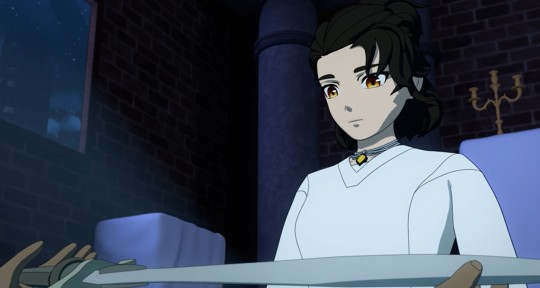
The only thing I think Rhodes did absolutely wrong was giving Cinder the sword while she was still under the owner’s thumb. Stupid, but not cruel. And again, stupid does not equal blanket responsibility. I’m likewise seeing, “Rhodes gave her the sword and thus it’s his fault that Cinder got in trouble. It’s his fault they died. What was Cinder supposed to do, not defend herself?” Are people forgetting that Cinder stole the sword herself in the beginning and then readily accepted it again? She had agency in obtaining weaponry and what she wanted it for. Are people forgetting that, in accepting it, she likewise accepted the risk of keeping it hidden in the hotel? Are people forgetting that the time skip shows this happening years later and that Rhodes clearly thought Cinder was past her murderous streak? Are people forgetting that Cinder killed the owner by snapping her neck and resisting the shock collar, no sword required? She could have killed them any time she pleased based on the crime scene, whether Rhodes had given her a weapon or not. The weapon was just the catalyst that, truthfully, could have been caused by anything else. Cinder snaps when they find the sword and she’s tortured. Cinder snaps when she drops another tray and she’s tortured. She had planned to kill her abusers and never completely let go of that.
Honestly, I’m just annoyed that we have another good hearted, takes action, does his best and makes some mistakes character getting blamed for everything another character chose to do, erasing their agency in the process. Rhodes did not abuse Cinder. Rhodes did not force her to kill her actual abusers. And Rhodes is certainly not responsible for what Cinder later becomes. Could Rhodes have done more? Of course, but every character could always do more.
The tl;dr is that this complex situation needed far better setup in the show and the fandom needs to stop using that lack of setup as “proof” that characters are horrible people when they fail to magically fix said complicated, badly explained problems. Cinder chose to murder three people. Whether that was justified in the face of her abuse is up to you to decide, but it was still her choice. Please stop blaming the adult male characters for the choices the teenage girls in this show make. RWBY is too convoluted and attempting to tackle too many complex issues to reduce that to, “Every man here is the evil, responsible party and ever girl is a #queen. Even when they go on to murder Pyrrha ^_^” As a woman who would very much like to be rooting for the mostly-woman cast more than I now do, this isn’t the feminist take people want it to be.
But I’ve jumped waaaay ahead. Let’s backtrack a bit.
That first interaction between Rhodes and Cinder is super weird because the camera keeps covering Rhodes’ face and I don’t know why.
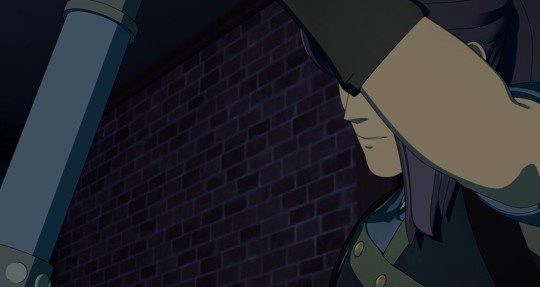
We segue into that montage of him training her for presumably years (Cinder’s hair changes) until we see him giving her the sword in what’s meant to be a moment of pride and trust. Soon after, Rhodes (randomly) comes back to the hotel when everyone else is asleep and hears noises in the back. Moving to check them out, he discovers that Cinder has murdered the two sisters and is in the process of murdering the owner, throwing back the line, “Without you, I am nothing, but because of you, I am everything.” Again, much more impactful if this had been a line we’ve associated with Cinder for years now, not a couple of episodes.
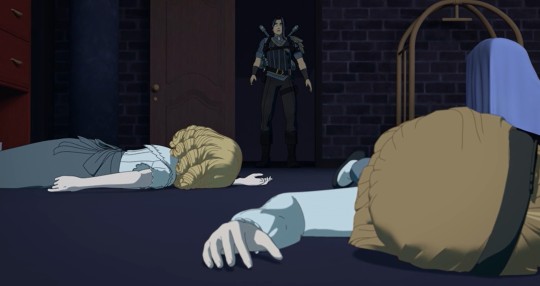
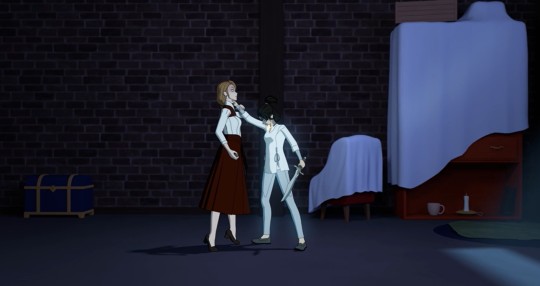
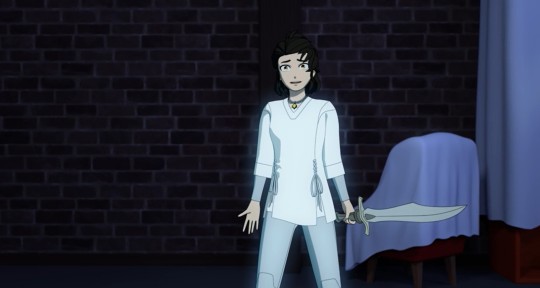
After she breaks the owner’s neck (damn, strong hand!) she tells Rhodes she doesn’t have to run anymore. Cinder clearly expects him to be happy for her and is shocked when he takes out his weapons.

I’m sorry, this is not a “betrayal.” Could Rhodes have just let Cinder go? Sure. Should he have? Given what she becomes, that’s very debatable! Rhodes clearly thought he’d helped her grow into someone who was not inclined towards murder (giving her the sword) and thus is probably going to be a little rattled when he walks in to find her killing three people. Again, there are obvious differences given the level of abuse Cinder seems to have suffered in comparison, but imagine that Glynda, after teaching Weiss for years, walked in on her killing Jacques and Whitley in revenge. Is she supposed to just ignore that? Shrug her shoulders and wish her well? I know a lot of people consider that the “fair” outcome given the inclusion of abuse, but that’s because we’ve had an omniscient view of Cinder’s history and insight into her emotional state. Rhodes doesn’t have that. All he has is his oath as a huntsmen to prevent things like, you know, murder sprees. I’m not going to delve into the overall ethics of a judicial system, either in RWBY or the real world, and thus I’m not going to make any naive claims about it being fair—it’s fucking not—but I don’t think the answer to these systematic problems is, “Why wouldn’t you just let the teenager murder three bad people and then go on her way? She totally deserved it!” Rhodes is not in a position to decide that, which is the entire point of having a judicial system in the first place.
So Rhodes wants to bring Cinder in. Kind of like how Clover wanted to bring Qrow in once he had an arrest warrant. I can’t emphasize enough that wanting to start a legal process rather than letting clearly guilty/potentially guilty people go because they WANT to is not a “betrayal.” Regardless of what teen dramas may have taught us, you don’t have to potentially throw your own freedom and your morals away because you found out a friend is wanted by the authorities. Or you walk in on them currently snapping someone’s neck. There are options other than, “Believe your friend is right without question and help them hide the bodies” (looking at you, Maria, Pietro). Whitely is not insane for going, “Hey, can you not make me an accomplice to a crime by forcing your way in here with a bunch of fugitives?” I’m constantly surprised by the number of fans who can, in one breath, condemn characters for not throwing a middle finger up at the law and in the next praise Jacques’ arrest. Do we want to benefit from this system or not? If yes, that means you have to weigh which laws can be broken (such as in a protest), which should be obeyed (bring murderers and wanted men in), all while working to change the laws that are prejudice and aren’t working.
Anyway, they fight. It’s short and sweet, backdropped by the large clock striking midnight, hence our title. I’m incredibly suspicious of Cinder breaking Rhode’s aura first, given that she’s still the student in training, but here we can more persuasively say he wasn’t fighting seriously, given that he then stupidly rushes towards her without a weapon. Still, that would be the second time now that RWBY has relied on elite fighters “holding back” to explain how the kids in training beat them, the first instance, of course, being with the Ace Ops.
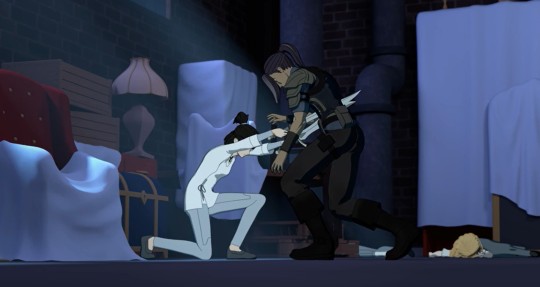
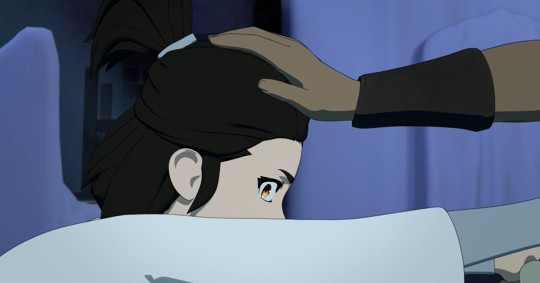
Rhodes does rush Cinder though when she hits the wall and breaks her own aura, clearly concerned. She uses the moment to stab him with both swords. He uses his last breaths to put a hand on her head, conveying that he doesn’t blame her for how this all turned out.
Then Cinder pulls off her collar with a single snap and looks up at the broken moon, crying her single tear.
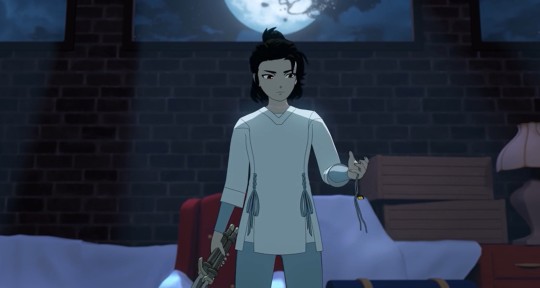
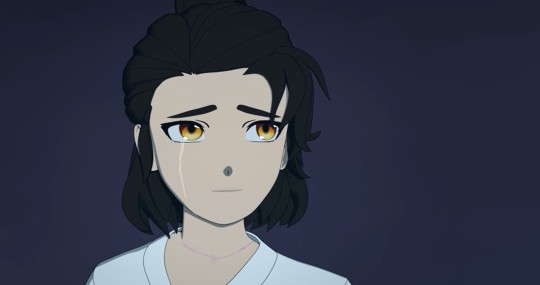
I’m dragging the flashback for multiple reasons, but I want to emphasize that I think this episode is leagues better from what we got last week. Absolute night and day. It’s just that, as always, improvements are incredibly comparative in RWBY. It’s not really good for numerous reasons… it’s just better than what we’ve gotten before. It’s “great” provided you go in with standards buried in the ground.
We then return to the present as Cinder wakes up in Salem’s whale. This scene gives us a great shot of her grimm arm, so cosplayers take note!
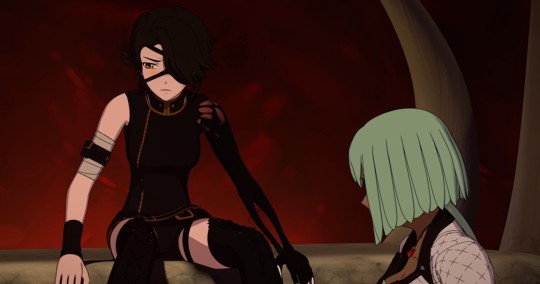
Emerald arrives soon after and immediately rushes to her side, expressing how worried she was. She grabs Cinder’s grimm hand without hesitation. Honestly, I don’t care much about either character… but this single frame activated some sort of ship button in my brain.
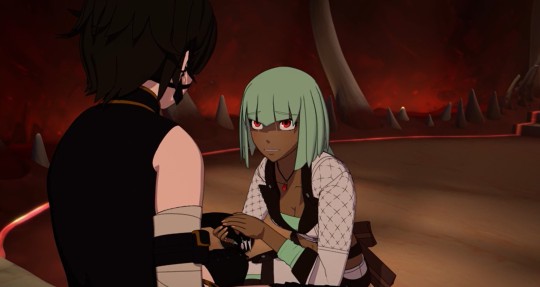
Not fully because I’m personally not drawn to toxic relationships in fiction (which, as I’m about to explain, would absolutely be the case here), but just the tinniest bit. Because I’m a sucker for monstrous people being loved despite their monstrous nature, so having Emerald take that hand over the other is like a ship speed run for me.
I’m predictable, folks.
But we need to talk about less happy things for a moment. I mentioned above Cinder becoming an abuser herself. I hope I don’t need to lay out the laundry list of murders, attempted murders, sabotage, and general taking-over-the-world-ness she’s engaged in since Episode One. Don’t let a sad backstory erase all that. Hell, for all we know the hotel owner had a horrific backstory too! Doesn’t justify how she treated Cinder. The point though is beyond her clear status as a villain, we now know that Cinder treats Emerald just like the owner once treated her.
Cinder was “rescued” from her life on the farm by the owner. Emerald is “rescued” from her life on the streets by Cinder.
Both realize over time that the situation they’re now in is actually worse.
Both reiterate that they “owe” the other “everything,” with Cinder having that shocked into her and Emerald seeming to willingly believe it.
The owner treats Cinder as a slave. Cinder treats Emerald as a slave. “Both of you, get out. I’ll let you know when you’re needed.” The only difference is that Cinder’s orders were things like “Scrub floors” and Emerald’s are “Convince an audience this girl attacked our ally.”
Both use threats to keep the other in line: the owner with her shock collar and Cinder with her Maiden powers. Cinder doesn’t need to resort to violence (yet) because Emerald adores her, but the threat is always there.
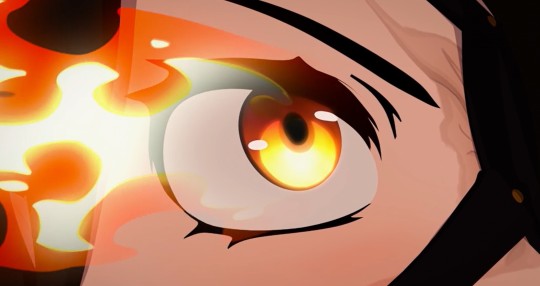
There are even visual similarities this episode, such as kneeling and gem necklaces, though I acknowledge fully that those are just interesting details as opposed to anything like persuasive proof.
The point is that Cinder became exactly what she hated, she just turned the dial up to eleven by going after the whole world instead of a single child. “But Cinder never had a chance to be anything else.” Sure she did. Blake and Weiss are proof of that. Even if we believe that Cinder was doomed to be a villain due to the extent of her abuse, what does that say about the hotel’s owner? We don’t know anything about her history, so what if she was abused too? Does that mean she was always “doomed” to treat Cinder that way? Does that excuse everything she did to her because she supposedly never stood a chance of becoming anything else? Of course not.
Though very iffily done, this is a commentary on the cycle of abuse. Each case is horrific, but it doesn’t excuse what comes later. Every abuser was once an innocent child and every innocent child has the capability of becoming the next abuser. Cinder’s life up until now was beyond awful and yes, she lacked a lot of privileges that others had to help them head down a better path, like Weiss’ wealth. On the other hand, she lacks other difficulties that would make that path harder for others, like Blake’s status as a faunus. Everyone has a choice to make: Will you treat others the way you were treated because that’s “fair,” or will you decide to treat others better than what you were dealt? There are lots of aspects that factor into the likelihood of someone choosing the latter—which is why I really like Rhode’s hand on Cinder’s head, acknowledging his understanding that she’s an abused kid taking the only path she thinks is available to her—but individual agency is by no means removed from the equation. Cinder escaped her situation and decided she’d never be powerless again. What does that mean to her, perhaps becoming a community member who works to prevent abuse like the kind she suffered? No, it means grinding the entire world under her heel until she’s the only one with power left.
This GIF continues to be the only one I need.

(No, the fact that it comes from a cop show and I’m using it for such an anti-law, anti-establishment story/fandom isn’t lost on me.)
(Also, if anyone is curious, this is why I love Ozpin. Out of everyone in this cast, HE has suffered the most, tenfold, and yet he still chooses to be kinder to those than they’ve been to him.)
Anyway, I should really stick to the plot lol. Cinder realizes that her waking up means that they’ve lost, which I still think is BS. Cinder needed a win to come across as a formidable villain again and the likes of Neo, Emerald, and a Maiden with years of practice under her belt should have wiped the floor with a scientist, retirement grandma, and a girl who got the powers an hour ago. But I again digress.
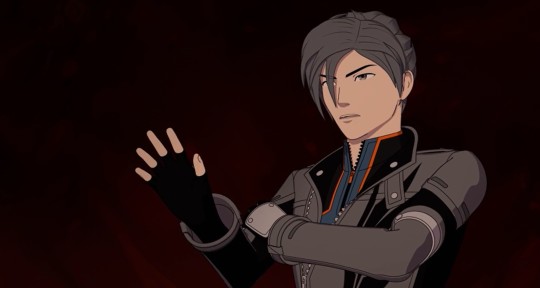
Mercury reveals that he will no longer be following Cinder’s orders because Salem has a special job for him. They’ve all been told to meet on the bridge.
Then we cut to Ozpin and Oscar.
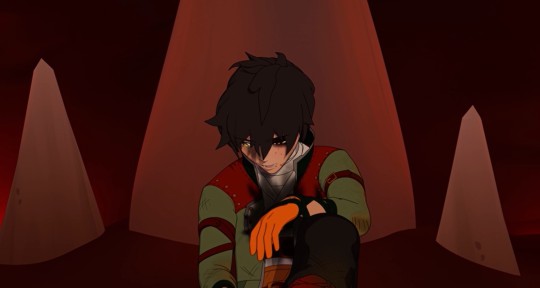
My poor boy is a mess and Ozpin is in the process of begging Oscar to take a “break.” “I would like to express again that this is my burden to bear, not yours.” Take note, fandom. In a few moments Hazel will accuse Ozpin of being a “coward” because “All this time, it could have been you, but you let him suffer.” I just know a bunch of people will be going, “Yeah! Ozpin just let a kid get tortured instead of him. WTF??” Okay 1. We should always be suspicious of agreeing with the takes villains have and 2. Oscar just refused to let Ozpin do that. It is—again—his choice because he thinks that Hazel is “holding back” with him. Oscar is being a brave and logical dude trying to make the best of this situation for both of them. Don’t take that away from him just to make Ozpin look bad. What would we even want him to do? Take control back? The fandom has been yelling at Ozpin for that since Volume 5.
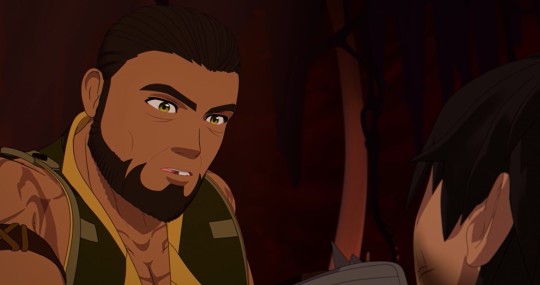
So they’re going back and forth when Oscar suddenly announces that they “can’t leave yet. This is our chance.”
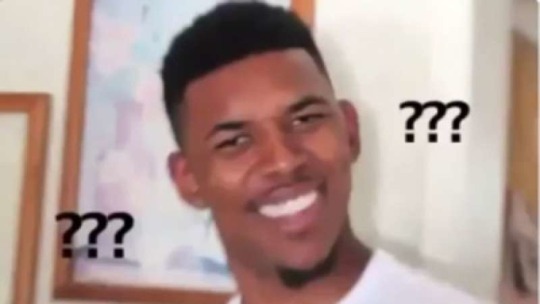
Ozpin even says he thinks Oscar must have taken one too many hits because… yeah. What? Long story short, Oscar recognizes that they’ll never be this close to Salem’s subordinates again and that they should try to undermine her from the inside out, just like she’s done with the world since she knows she can’t take on everyone at once. I love Oscar taking charge here, I love them speaking in unison, I even love the hope of achieving something epic while in captivity despite my own belief that Oscar should break and reveal the Lamp’s password. What I don’t love is:
Another messy, unexpected belief that Salem made her choices because she “knows” she can’t win any other way. Except that—like Ruby’s line in the recording—Salem’s current attack blows that idea out of the water. She IS taking on the whole world. Granted, Ozpin and Oscar presumably don’t know that the whole world literally knows of her existence now, or that Salem was smiling about it, but they do know that she’s attacking Atlas head on. What else is that except a declaration of war with all of Remnant?
The idea of undermining Salem from the inside via Hazel. For anyone who reads my other metas, I just said that this idea wouldn’t work because Emerald isn’t the one torturing him, the one character who has consistently demonstrated hesitation (or, now, Neo). Hazel despises Ozpin so much that he would never listen to him. He despises him so much he doesn’t even see Oscar as his own person… at least he didn’t before. That’s been retconned now with Hazel going “easy” Oscar and having an actual conversation with Ozpin. Whereas before, he was slamming Oscar into walls and screaming about how he’s going to kill the “murderer” of his sister. They basically softened his character to make this plan possible.
The fact that this scene came about without Oscar and Ozpin ever getting to reconcile their problems. Last we saw them, Oscar was saying how he hated that Ozpin came back and refusing to acknowledge their merge. Now, they’re working together like they’ve always been solid allies. I get that the danger they’re in helps to put it all into perspective, but why can’t we get a few lines of them hashing this out? Or at least putting things aside until they’re out of Salem’s clutches? If you don’t need to re-write Hazel’s character with “he’s going easy on me” lines, you can use that space to deal with the conflict we’ve already established. Especially given the strange choice to have Oscar refuse to give up control and be the one coming up with this plan... but then Ozpin does take control and (maybe, see below) enacts it? I feel like we’ve missed huge chunks of this story. As it is, I wonder if RWBY will bother coming back to this. The questions of if/how Oscar will accept Ozpin and if/how he’ll reveal this secret to the group feels like they’re being swept under the rug and it will likely go unnoticed by a lot of viewers simply due to how intense the kidnapping plot is.
So things are a little messy, but otherwise enjoyable, and they’re about to get downright confusing. For me, anyway. See, Hazel reveals that he follows Salem because she can’t be beaten (cue my continued worry about Ruby telling the whole WORLD). She “can’t be stopped. She’s a force of nature,” and Ozpin is fighting a “cause with no victory, no end.” He yells back that “Someone has to try!”—bless this man—and then looks down at the ground going, “Salem can be fought. Unless… she brings the Relics together, if that happens…” and mentions summoning the Gods.
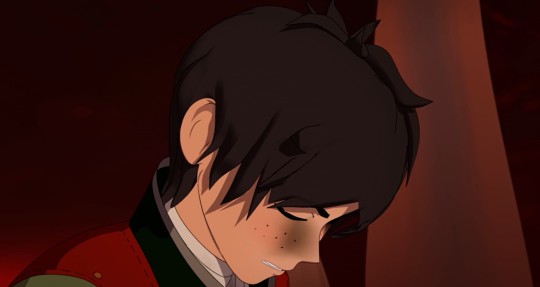
So here’s my confusion. The scene makes it feel like Ozpin is planting some sort of seed in Hazel’s head. He and Oscar JUST got done agreeing to try and undermine her from the inside out, then we get this line that feels like him “accidentally” dropping a secret that will turn Hazel against her. Except… Ozpin doesn’t lie here? The line isn’t useful to them as far as I can tell. They are screwed if Salem gets the Relics. …Right? Because if not, why the hell have the heroes been working so hard to keep them out of her hands? So I can’t decide if:
A) This scene is just written badly and none of this is part of the plan to undermine Salem.
B) Ozpin is going, “NO. Don’t collect the RELICS. That would be the WORST THING EVER /s” in an attempt to trick Hazel into doing it anyway and this is somehow supposed to hurt Salem, despite being presented since Volume 5 as the worst outcome for our heroes?
C) Ozpin specifically wants Salem to make the mistake of summoning the Gods because he thinks he’s completed his task? Or something? But what in the world would make him think that—especially without seeing Ruby’s message (not to mention the lack of unity that mess should cause)—or what makes him think the Gods would just destroy Salem regardless of what he’s achieved? If summoning the Gods was ever a defeat Salem option, why hasn’t he done it before?
I’m leaning towards A just because it makes the most sense by far, but that would also mean we had Ozpin and Oscar decide on this plan, have a chance to start this plan… and then didn’t actually do anything. Yelling at Hazel for following Salem isn’t a new strategy, they were doing that before, so what’s new? Or has the new strategy not been revealed yet? Idk, as happy as I am to see them being BAMF together, I’m slightly unsure about how it all hangs together. I’d much rather have an internally consistent and clear outcome that’s predictable (Oscar breaks or just holds out until rescue) rather than what appears like a super cool, badass, unexpected plot on the surface… but crumbles once you poke at the foundation a bit.
So whether Oscar and Ozpin started this plan or not, they’re dragged into the throne room where they’re forced to kneel before Salem. Yikes. She sits on her throne with the Hound, who I’m only now realizing could be read as a messed up Toto
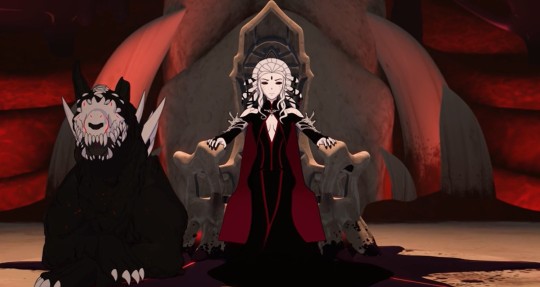
We learn that Tyrian heard from Watts about his incarceration and hacking Penny. What? Okay, I took the time to go back through “Amity” just to find this screenshot.
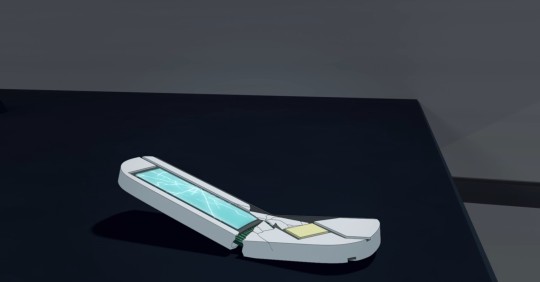
That’s not a working Scroll! Idk what I thought Watts might do with it at the end of last week, but it wasn’t send a full, uninterrupted message to Salem that updates her on everything that’s gone down in Atlas. This thing is toast! Moments like this make me question how much communication there really is between the writers and the animators, despite last Volume’s disaster with Oscar telegraphing his punch like whoa. Are we still getting that level of miscommunication?
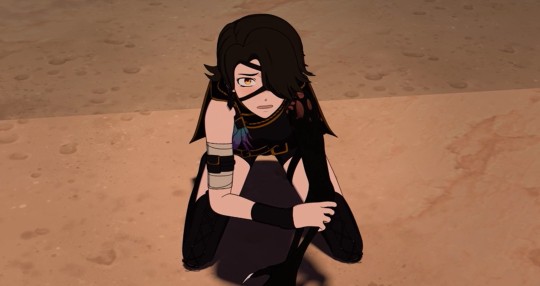
Salem then punishes Cinder for disobeying her by hurting her grimm arm. See, this here (for me, anyway) is the mark of a newbie writer. When the moment first started I went, “Oh nice. Just like the shock collar!” Then the scene made that abundantly clear by cutting to flashbacks of Cinder in her collar. That’s too heavy-handed. We already got the parallel, but then the show went, “Do you get it??” It shows that the writers are too scared that the viewers won’t get it, that their nuance will be lost, so they scramble to make it as obvious as possible, rather than trusting in their own writing.
And if you’re like, “So you want RWBY to be more clear and also… less clear?” the answer is, sadly, yes lol. The things that are already confusing due to retconning and inconsistent themes need to be made explicit, whereas the details that are already strong don’t need an in-your-face, “Okay, but did you really get the parallel here? We’re just making sure.” It’s like launching into explaining why a joke is funny when it’s already landed vs. telling a nonsensical joke and then waiting for the laugh that will never come. RWBY struggles in both areas.
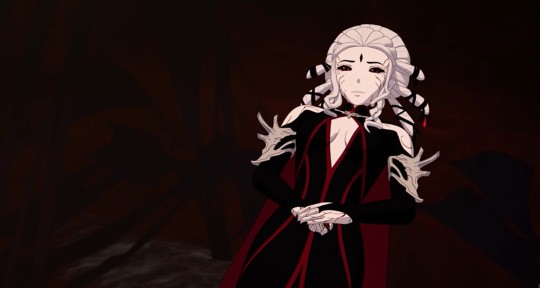
Salem delves into this speech about how this is actually all her fault and she should let Cinder spread her wings or something. AKA, go free Watts and track down Penny. Then you can have your precious Maiden powers.
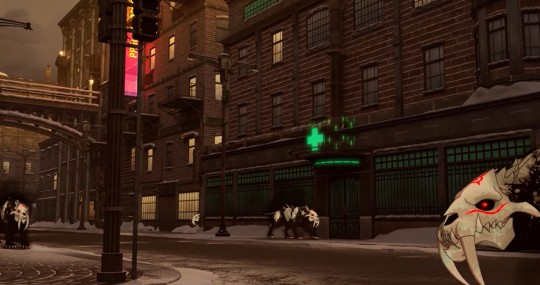
There’s a massive earthquake across Mantle and we watch a + medical symbol go out. Again, heavy-handed. We don’t need that in order to understand that the whole city shaking while the grimm look happily up to the sky is a bad thing.
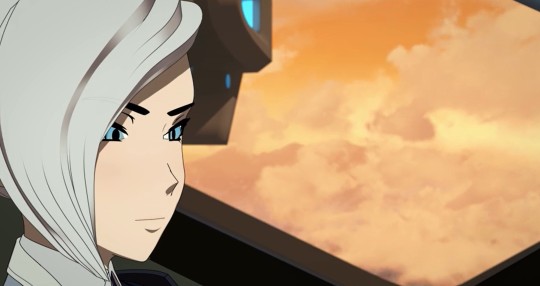
We cut to Winter listening to the Ace Ops complain about Penny. She tells them to act like the elite they are, likely because she hates how they refer to Penny as “junk.” Still being set up to betray Ironwood, I bet. During this scene we learn that they have “confirmed visual of her leaving Amity. She appeared to be malfunctioning.” So Penny is alive? Also, they have eyes on Amity Tower and were able to see Penny leaving, but didn’t see any of our trio coming to launch it in the first place? Did Ironwood want it to launch? Did they see Cinder? I just don’t know.
Before they can get there though a message from Jaune comes through. Serious kudos to Team JNY for asking that “anyone” respond/taking the personal risk of calling for help in the first place. They’re finally putting—as Harriet says—they’re own selfishness aside in favor of the greater good. Yang obviously hates that it’s “you guys” they ended up with, but she’s not outright attacking the Ace Ops or anything. I’m like,
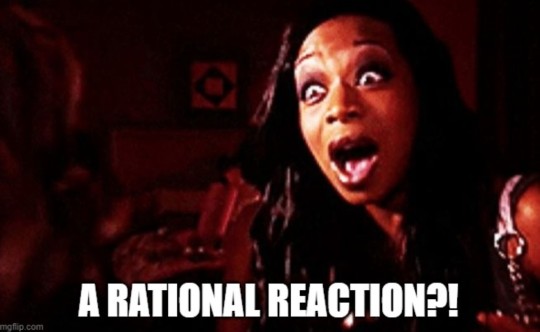
Excellent job, Yang.
Jaune is a little harsh in his panic. He said in his message that a “large mass of grimm” is heading towards Mantle and then when Harriet leads with asking about Penny, wants to know what’s wrong with her. Why are you asking about Penny when lives are in danger and “it’s” (the grimm) are “right there”? Except he, uh… points at nothing. There’s the chasm with (I presume) the weird grimm goo down it? Not sure based on the shot, but the Ace Ops expected a “mass of grimm” and then land to see no grimm anywhere nearby. So yeah, they’re more focused on the missing Maiden than the seemingly imaginary enemy Jaune is freaking out about.
They only get on board when the river launches itself at Atlas.
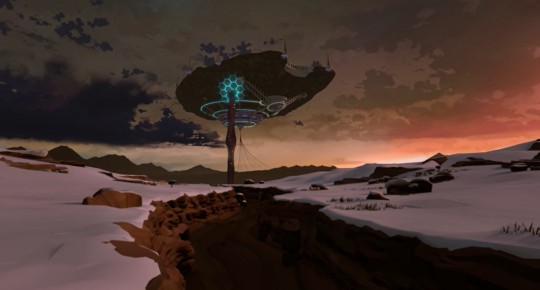
So the goo is, like, sentient before it becomes individual grimm? Or Salem is controlling it from her whale? Either way it’s BAD.
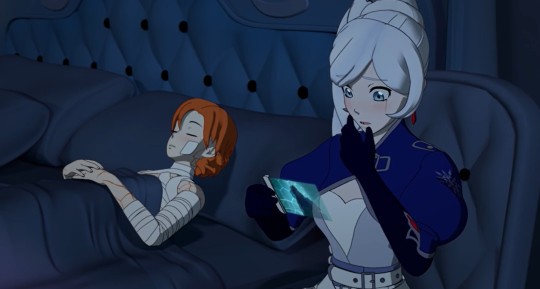
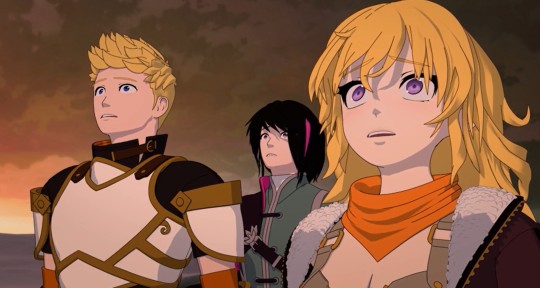
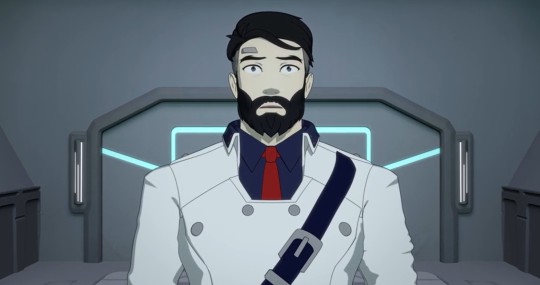
I want to briefly gripe about how the hell everyone is watching this. What, is there a camera conveniently trained on this one random part of Atlas’ underside and everyone’s scrolls tuned into that the second the attack started? It seems far-fetched, to put it mildly. In RWBY’s favor though, I want to acknowledge that we finally have appropriate expressions for the situation! This is good!!
I’m going to level with you all. My notifications have known no peace since I made the mistake of criticizing the adored trio that is Ruby, Weiss, and Blake. I thought supporting Ironwood would get me heat. Nope. Not supporting the main girls is what did it and honestly? I shouldn’t have been surprised. Last week I pointed out that having them smile and, in Ruby’s case, coo during a moment of horror is not good animation and implies some pretty uncomfortable things about their overall sympathy level. The image in question:
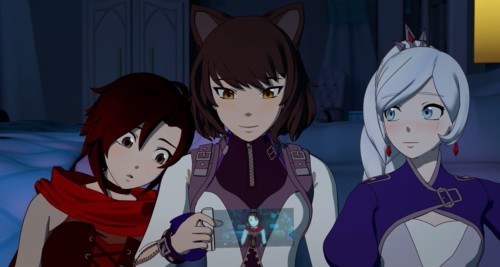
It doesn’t set a good tone, especially when we add in what we’ve gotten for Ruby’s group across the rest of this volume. The counters of, “They need and deserve a break. Why won’t you let them be happy?” fall flat when we ignore that this group has been animated as consistently goofing off post-premiere. Sneaking into the guarded military base of a former friend? Tube shenanigans! Need to find your way around? Funny Penny moment! Semblance reveal? Cutesy chibi explanation! Need to do more sneaking? Silly coffee plan! Nora gets electrocuted? Joke about how awesome that was! Even Wiess telling Whitley to go to his room reads as funny to the audience.
Ruby in particular has been a problem, given that she’s our main character and the others’ leader. We take our emotional cues primarily from her. Alongside being a part of all these fun and games, her animation during more serious moments has been less than stellar. This is Penny when Nora goes down.

This is Ruby, Weiss, and Blake. No worry, just focused on the fight.
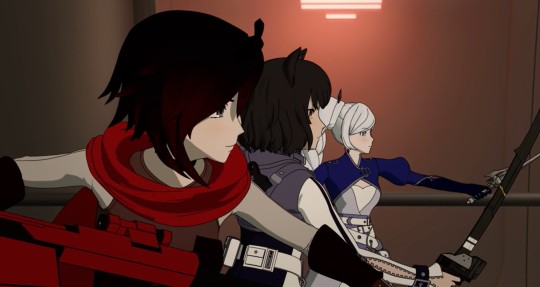
This is Penny when the fight is over.
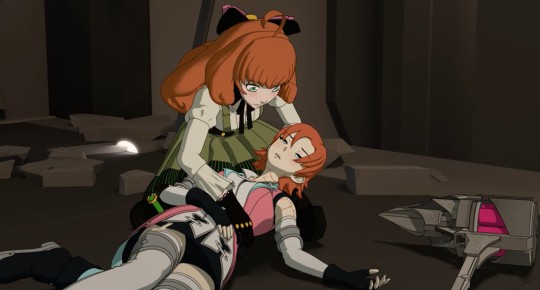
This is Ruby, Weiss, and Blake. No worry, just chatting about suspicious activity.
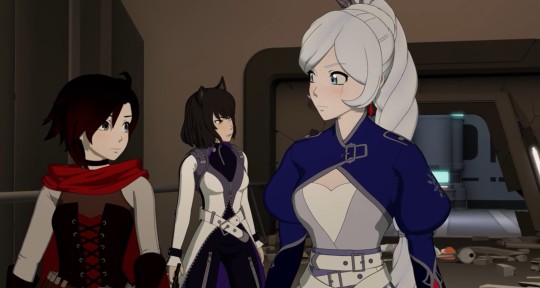
This is Penny in the airship, worrying about Nora and the situation they’re in. This is also Ruby in the airship, apparently not worried at all.
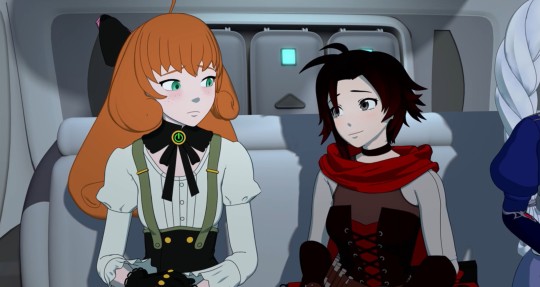
This is Ruby when she learns her uncle is in jail. Is there shock? Fear? Horror that he might be in serious trouble? No, she just maintains the same emotion she had before: fury at Harriet.
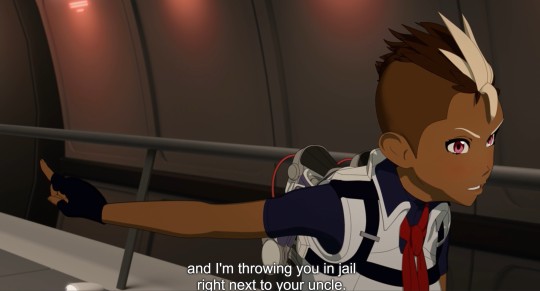
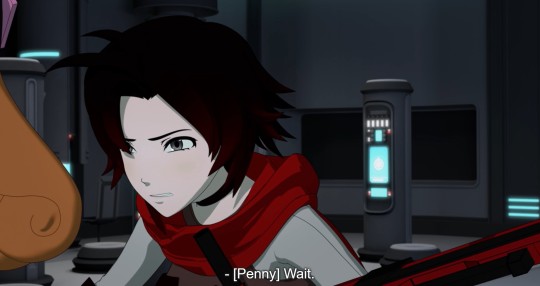
So when we reach them watching the recording and they look like this:

No, I’m not convinced that this trio is taking the situation seriously, or that they really care about the people involved. I know they’re supposed to care, they all obviously care from a meta perspective, but the “obviousness” of that only exists in our personal understanding of the characters if we don’t see it on screen. I completely believe that Penny is worried about Nora because she’s animated expressing that worry. I completely believe that JRY are in the middle of a warzone because they’re (mostly) animated as fearful and angry. The rest of Ruby’s team has a scared line from Blake and Weiss holding Nora’s hand, whereas the majority of the emotion across this adventure has been indifference or playfulness. That’s a problem given how horrible the events of this Volume have been, most of which the group is aware of.
All of which is an incredibly long-winded way of saying that this
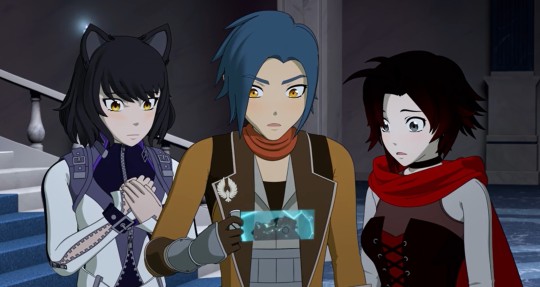
finally feels appropriate. Well done, RWBY.
Alright, this recap is already over 7k long so I want to return to our plot with the summarized: IRONWOOD WAS RIGHT. He said they couldn’t withstand a head on attack by Salem and he was right. It literally took seconds for her grimm to burrow into Atlas, knock out a tower, and disable the shield. Everyone still claiming that leaving is useless because it’s oh so obvious Salem’s grimm could fly however high it wants (when did we learn that?) are ignoring that leaving was at least a plan with some kind of hope attached to it. And, given her focus on the Staff, may have saved Mantle by drawing Salem’s attention away from the city. The point is we don’t know. All we do know is that Ironwood tried to do something in the face of hopeless odds, Ruby’s team stopped him, and now look, everything is awful. No one could have possibly seen that coming.
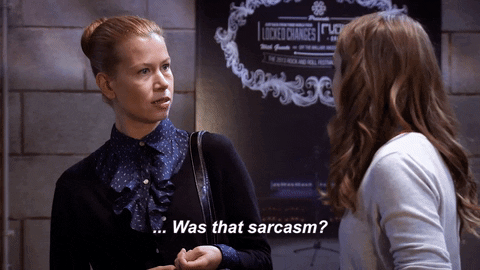
Salem: “It’s time.”
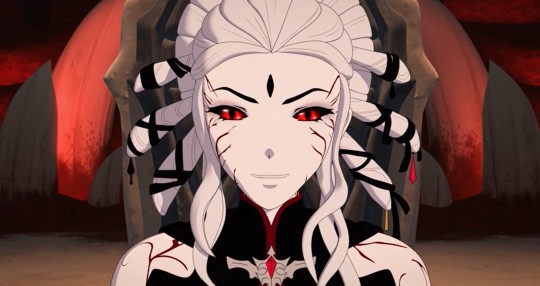
I’m very pleased that Salem is finally using the tools at her disposal. Upon reflection, I still don’t buy why she had to wait. “Well, she was waiting for the grimm goo.” She couldn’t have used flying grimm to take out the tower? Take a burrowing grimm and give it wings? She couldn’t have used the goo that was apparently inside her whale the whole time?
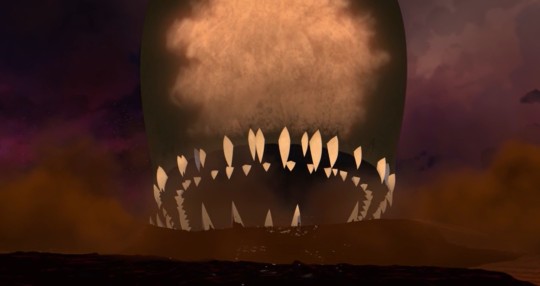

It’s all very convenient. In the sense that we’re drawing out the volume by having the villain inexplicably hang back, despite not having a good reason to. In the sense that—unless Ruby’s message comes back to bite her—the villain’s passivity also conveniently let the heroes accomplish the one goal they were desperate to achieve. All of that’s still not good, but at least the Volume seems to be moving out of the “not good” category and into the “slightly better” territory.
Although, as I just acknowledged to a friend, RWBY seems to alternate for me. Every time I have an episode where I think, “Okay, there are still massive problems here, but I can see a glimmer of hope” the next episode is inevitably the pits.
Still, grabbing onto that hope with both hands: Atlas should be decimated, folks! Grimm are swarming, our idiot heroes herded everyone directly under the city, the world should be panicking, and the cold should still be killing people if the story remembers that it exists. At this point my only question is wtf our heroes are supposed to do next, but regardless of what the plot gives us, it’s going to be wild. You all know what’s coming. Next week is our final episode before a two month hiatus, which means we’re going to witness all kinds of awful and then end on a six week cliffhanger. It’s inevitable, so best to emotionally prep for that now lol.
I don’t believe we have any Bingo updates, with the exception of edging towards a few: “Winter betrays Ironwood,” “Army of grimm conveniently doesn’t kill any civilians,” “Atlas somehow survives,” and “Ironwood dies” being the most notable. We’ll have to see what, if anything, gets checked off next Saturday.
As always, thank you so much for reading (I feel like I don’t say that enough :D) and I’ll see you next week! 💜
[Ko-Fi]
93 notes
·
View notes
Note
I agree with you partly, but I think what people mean when they say Seb and Lewis can do what they do when others can’t, it’s because they are World Champions already. Job security is one thing, of course Red Bull won’t fire Max, Ferrari won’t fire Charles etc, but most drivers aren’t actually that secure in there seat. But even for them, let’s say some country actually bans someone from racing there (which I do find highly unlikely in any case), the lost points won’t cost Seb and Lewis the big dream I guess? Meaning like when Max says that it’s that big goal, getting that one WDC and then the rest is kind of a bonus, I think a lot of the drivers that don’t have a championship feel that way. Lewis obviously cares about winning, but I don’t think we should pretend like pre-Championship winning Lewsi would have done what he’s doing now, or young Seb doing what he is doing now. Obviously everyone who wants to be an activist can be, and anyone who isn’t is choosing that, and we should absolutely frame it like that. But also, I do think that activism (and that’s not just for athletes, but for everyone) costs different people different things. It is absolutely easier for some people to be activists than others, for less privileged people that goes tenfold btw. Even if it’s just an concentration/focus thing, or a feeling of having still something to prove, vs. having already achieved so much. I don’t think it’s 100% fair to completely ignore those things in that discussion either.
Thank you for this message! I will admit, I'm no expert. This is my first year as an F1 fan, so it's possible (even probable) that I'm missing important context. Is there precedent for a driver being banned from racing in a certain country? Or precedent for a driver being fired for something they said off the track?
I guess from my limited knowledge and perspective, it just seems to me that the job security part of it is vastly overstated. Even for drivers on shakier footing, like rookies or drivers in back-of-the-pack teams, I imagine there would be huge public outcry if they got fired for saying something as banal as "Human rights are important." It's very hard for me to imagine that there would be any consequences for something like that.
In terms of what you said about the WDC, I can sort of see what you mean. Some of the younger drivers may not feel like they have a platform yet, or may not have the confidence yet. But on the other hand, it's not like Lewis and Seb are doing complicated things like boycotting races or meeting with the FIA to demand changes. They're just speaking out and showing solidarity. Anyone can buy a rainbow shirt like Mick did. And when other people are already speaking out, it costs even less to add to their voice.
That said, I absolutely agree with you that activism costs different people different things, and I'm not saying everyone who doesn't say anything is a bad person. I don't think that at all. But honestly, in a sport that has allowed so much racist abuse to happen, I think activism has cost Lewis more than it would cost just about anyone else, so in general I still stand by my original point. There's definitely some nuance there though, so thank you for adding your thoughts.
4 notes
·
View notes
Text
Election 202 Presidential Candidates Assessment
Green Party (Howie Hawkins / Angela Nicole Walker)
Monitor and Prosecute White Racist Terrorists
Federal Investigations of Local Police Misconduct
Community Control of the Police
End Mass Incarceration—Treat Drug Abuse as a Health Problem, Not a Criminal Problem
Legalize Marijuana
Decriminalize Personal Possession of Hard Drugs
Drug Treatment on Demand
Decriminalize Sex Work
Fight Corporate Crime
End Warrantless Mass Surveillance
Pardon Whistle Blowers and Political Prisoners
I agree strongly with pretty much everything on this list but there are a couple that I think could be worded a little bit better or I am just misinterpreting what it says. The one that bugs me the most is, “End Warrantless Mass Surveillance” because I can’t tell if it is saying there should be camera like in the streets because people don’t consent to them? If that is the case, then I do not agree with that at all because I think cameras are necessary to catching crime and maybe even preventing crime because they know they will be on camera. I really like the what they are saying about the policemen and how they have to be held accountable for their actions and just because they are are policemen, it doesn’t mean they just have the right to do anything with no consequences. I think legalizing weed would be smart because it is proven to be not as bad for you as alcohol and people don’t become aggressive so maybe people will make the switch to weed as they already are.
The beliefs of these candidates to coincide with the beliefs of the rest of the political platform which would be expected in my opinion because if they didn’t then why wouldn’t the candidates just run under a different party unless they knew they couldn’t compete with Biden and Trump.
Republican Party (Donald Trump / Mike Pence)
-As we all know by now, Donald Trump loves his “Men in Blue”, which I respect, but there is one problem. Donald Trump will rarely admit something they have done is wrong when in reality, they do a lot of things wrong and they need a quick reform and that would just be a start to getting this country to come closer together but he is a very stubborn person and will likely never do that. Donald Trump has given money to cities to help them restore their equipment when in reality, what they need is longer, stricter, harder, and better training. Students should not be criminalized for what they believe in.
I agree with Donald Trump in the fact that policemen are very important. I personally do not think policemen are doing more harm than good on the individual basis, but the many people are perceiving this whole situation is that all policemen are bad because a few cops are and with social media, the bad videos are obviously going to go viral much quicker than the good videos. With this being said, the few bad cops are making all the good cops look bad and so people could say that “policemen are doing more harm than good” but I think policemen get too bad of a reputation because of a few sick and cruel cops. I am not agreeing or disagreeing because didn’t put this on his website, but policemen definitely need more training and it needs to be harder to become a policeman. I do not understand why he can’t see that even with the few bad cops, people are just asking for a change and they aren’t getting it so they will continue to be angry.
This website agrees with the republican website and I wouldn’t even be surprised if the people who made the Republican Party website helped out with the Donald Trump Website and vice versa.
Peace and Freedom (Gloria la Riva / Sunil Freeman)
End mass incarceration and police brutally and end racism.End mass incarceration of oppressed and all working class people. Fully prosecute all acts of police brutality and violence. Free Leonard Peltier, Mumia Abu-Jamal and all political prisoners!
After reading through the rest of their ideals, it is really difficult for me to say that I would identify with this group or agree with them. I don’t think very much time was put into this website because one of their points was just, “end racism.” Ok... and how are you going to do that? That is what I want to know. I can’t say everyone, because there are always exceptions, but 99.9% of the United States wants to end racism. Saying that doesn’t help whatsoever. They gave no suggestion on how to end racism but if for some reason they were elected all of the sudden racism would just end? This website sort of gets on my nerves the more I read about it. This is sort of off topic, but one of the points made on this website is “Shut down all U.S. military bases around the world—bring all the troops, planes & ships home.” In my opinion, this is just super dumb. Yes, nobody likes war, but if you shut down all the military bases everywhere then all of the United States citizens will be at risk and people will come tot he United States to attack. It seems as if whoever wrote this website doesn’t think that there are still bad people in this world except for cops. I don’t see how a platform can have so much hate towards policemen but yet have faith in the rest of the world to not harm our citizens. I could have interpreted this whole thing wrong but it was really weird reading this and thinking that people actually believe in it. I do agree for the most part about the criminal justice though.
For the most part, this website agrees with the party platform but the party platform website was much broader than this website. This website went into like a few specific case scenarios but didn’t really cover the overarching theme.
American Independent (Rogue de la Fuente “Rocky” Guerra / Kanye Omari West)
-Dear Mr. Rocky de la Fuente,
The issue I am concerned about isc riminal justice. I am concerned about this issue because because it is a very big issue in 2020 and different candidates want to handle it in different ways. I am currently a senior at Acalanes High School and I am researching this issue for my senior Government class. Please clarify your stance on this issue. Thank you so much for your time and good luck.
Sincerely,
Mitchell Franklin
(Yes this was sent, I just put it here so I could fill the space with something. If he responds, then I will edit this blog post)
Libertarian (Jo Jorgensen / Jeremy “Spike” Cohen)
-We claim to be the “Land of the Free” but yet we lead the world in incarcerations. This is not to say that we should should just start letting people out of jail, but she thinks that if the crimes are not violent and if they are are drug related, then those people need help more than anything which I completely agree with. Putting them in prison will just make them even worse and maybe even turn violent. There should be no law that prohibits a person from owning an object. Whether that object is a gun, or if it is a drug. If there is no victim, there will be no crime which means she will decriminalize everyone who falls underneath that umbrella.
I agree with what Jo says because people are getting put in prison way too easily as if it is going to make them a better person. It is a known fact that putting people in prison will not make them a better person. In fact, more times than not, it makes them a worse person. What these people need is education. I disagree with the fact that all frugs should be legal. I think I interpreted that right from what she said because she said “owning an object should not criminalize anyone” but the fact of the matter is, with the worse drugs, people get addicted, then they resort to stealing which has a victim so why not just stop that from the beginning. I think they should but other than that, I really like her ideas of keeping the non violent people out of jail because it will only make them worse.
This is pretty much exactly what the party platform website said. Both this website, and the party platform liked to focus on having less people in prison and not convicting people of crimes that are not violent.
Democratic Party (Joe Biden / Kamala Harris)
-Today, too many people are incarcerated in the United States – and too many of them are black and brown. To build safe and healthy communities, we need to rethink who we’re sending to jail, how we treat those in jail, and how we help them get the health care, education, jobs, and housing they need to successfully rejoin society after they serve their time.
1. Our criminal justice system cannot be just unless we root out the racial, gender, and income-based disparities in the system.
2.Our criminal justice system must be focused on redemption and rehabilitation.
3. No one should be profiteering off of our criminal justice system.
I completely agree with all three of these main points. There was one more main point, but it was sort of summarized in the top section. The bottom one is really important. If people are making a profit off of incarcerating people (not the government because it is insanely expensive to house inmates) then they will want to keep having people incarcerated so that needs to stop, and if Biden is elected, his plan is to make sure that doesn’t happen. Another one is making sure the policemen are not being racist and if they are, they need to be punished because there is a very large number of black and brown people and part of that is because due to the people who arrest them in the first place.
This website is very similar to the Democratic website because these are the Democrats who are running for office. Both websites focused on focusing in on reforming the police foundation and incarcerating less people which is very important to a healthy community, state and nation
2 notes
·
View notes
Photo
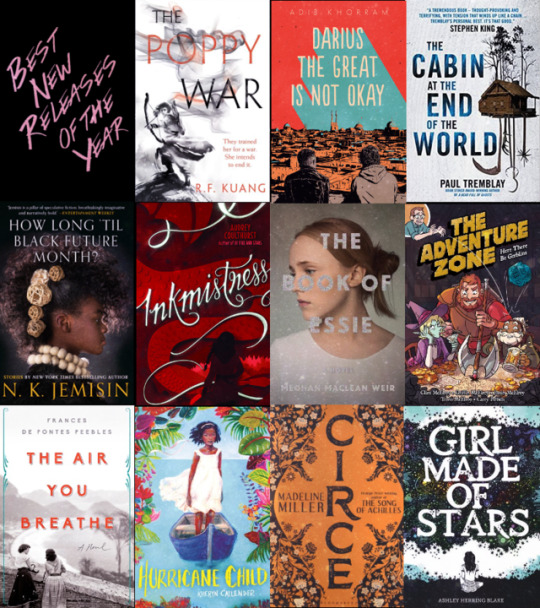
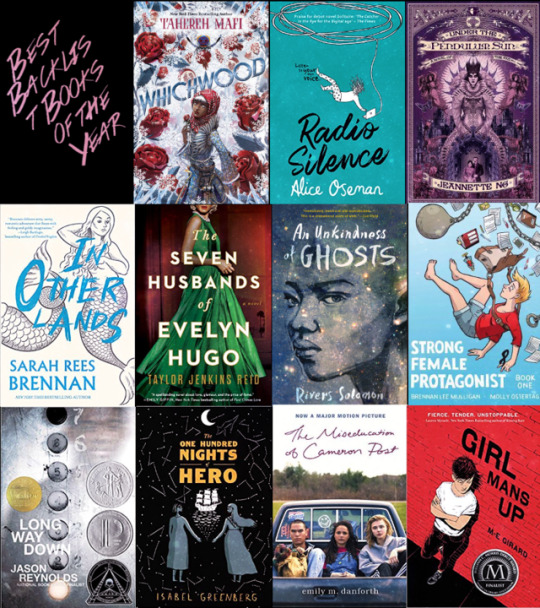
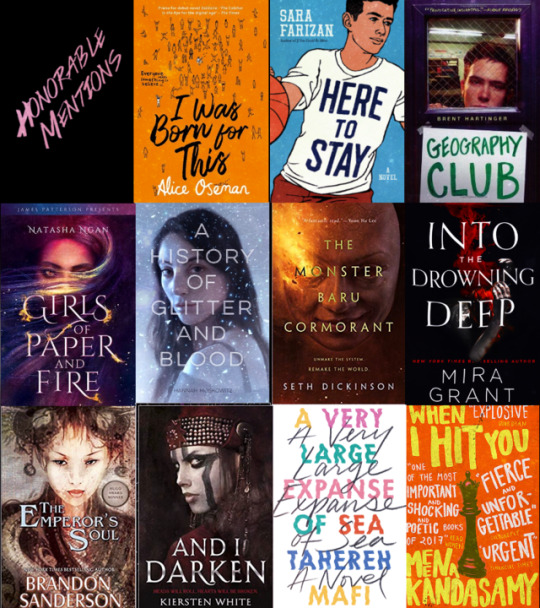
It’s the end of the year (Well, not quite, but I’m not gonna get any reading done tomorrow) - and we all know what that means... Looking back at what you read and evaluating your favorites. And no, I did not contain myself to just 10 - but that’s also because I did read a lot this year. Why are they eleven books for the first two categories? Any excuse to include one more book It looks better on the graphic. Although, before someone asks why the Broken Earth Trilogy isn’t on here - Rereads don’t count and I read those in 2017. For a more detailed look at each of my lists, links to the books, and more of my thoughts, look under the cut. For a list of all of my favorite books look here.
Now, on to these...
The best new releases of the year
Now, obviously, I did not read every single book that was released this year - duh. This is just a list of the best 2018 releases that I read this year. Ranked, they look like this:
Girl Made of Stars by Ashley Herring Blake.
Why I loved this one: It’s a really honest, well-written, gentle, well-done, nuanced, and detailed examination of what rape does not only to a person but also to a community from a perspective I’ve never seen considered before.
Darius The Great Is Not Okay by Adib Khorram
Why I loved this one: Because I love well-done coming of age narratives and this one was excellent. It’s a very quiet, introspective, slow moving book with a softer main male character. I also really appreciated the setting of Teheran.
The Book of Essie by Meghan Maclean Weir
Why I loved this one: Look, it’s one of my very specific favorite tropes of all time (I’m not going to spoil it) that I almost never see, the main character is interesting and strong in a mental way I really enjoy, and it’s a deconstruction of conservative family culture. Yay.
The Adventure Zone - Here there be Gerblins by Griffin McElroy
Why I loved this one: I jumped on the hype train and listened to the podcast - and like, this is a comic adaptation of the first arc? Which is so much fun?
The Air You Breathe by Frances de Pontes Peebles
Why I loved this one: I loved the main character who was bitter, and passionate, and jealous and lovin, and complicated and determined and stern and regretful. It was great. If you loved Evelyn Hugo, this one should be your next read.
The Cabin at the End of the World by Paul Tremblay
Why I loved this one: This thriller was very unique in the way that it put its focus on just one family, and the whole rest of the world was not really present. Instead we get a very closed, and isolated narrative where everything but the characters we follow and the relationships they have with each other is called into question.
How Long Til’ Black Future Month? by N. K. Jemisin
Why I loved this one: I refuse to comment on claims that I light a candle of my very own N. K. Jemisin shrine every night before I fall asleep. If you haven’t read The Fifth Season - go read them right now. My favorites from this collection include: Valedictorian, The Storyteller’s Replacement, Walking Awake, and Henosis.
Circe by Madeline Miller
Why I loved this one: I’m a huge slut for greek myth retellings, if you’re a semi-competent author retelling any greek myth, I’ll eat it up. And Miller is more than just semi-competent.
The Poppy War by R.F Kuang
Why I loved this one: Listen, listen, listen - you know how to get me as a reader? Training sequences and school settings. This has 250 pages of training sequences in a school setting. It made me very happy.
Hurricane Child by Kheryn Callender
Why I loved this one: Everyone’s excited for this author’s other book, which is like, a YA romance and to be fair, I haven’t read that one yet, but still - why is this one so underrated? It’s a magical realism coming of age story of a young girl and it’s stellar.
Inkmistress by Audrey Coulhourst
Why I loved this one: I wasn’t the biggest fan of the author’s debut, but this has a lot of things I love - “be careful what you wish for” style blood magic, dark self-fulfilling prophecies, and a female characters journey from hero to villain. Also dragons.
The best backlist books of the year
Meaning, the best books I read this year that were released in 2017 or before that. Pretty simple, really.
In Other Lands by Sarah Rees Brennan
Why I loved this one: It has been a long time since I was this attached to a group of book characters that quickly. They’re instantly relatable, even if they’re not instantly likeable. And beyond that, the whole book is a wonderfully satirical take on the portal fantasy genre. But seriously, guys, there’s not enough of fanfiction for this book - I’d know it, I read them all.. C’mon, where’s my soulmate AU?
Radio Silence by Alice Oseman
Why I loved this one: One of the best YA novels out there and not only one of my favorite’s of this year, but also one of my favorite books of all time. Alice Oseman understands the teen coming of age story on a spiritual level, and manages to be so wonderfully affirming in this one.
The Seven Husbands of Evelyn Hugo by Taylor Jenkins Reid
Why I loved this one: Listen to the hype, everyone, listen to the hype. Evelyn Hugo is an amazing character and I’d 100% believe you if you told me she was a real person. PLUS, this one also has the trope. The one I talked about with the Book of Essie.
Strong Female Protagonist by Molly Ostertag
Why I loved this one: Well-done, deconstructionalist superhero narrative are my jam. This webcomic is not that action driven, instead it focuses on the main character identity crisis, and her reconsidering what it means to be a hero and what her responsibility as a human is.
The Miseducation of Cameron Post by Emily M Danforth
Why I loved this one: Do you think the owner of this blog might like coming of age narratives? I’m not super sure, like, maybe if she had “I love coming of age narratives” tattooed on her forehead, it would be a little clearer... but like this? It’s a mystery.
Whichwood by Tahereh Mafi
Why I loved this one: No, I did not read the first book in this series, and I don’t think you need to in order to enjoy this. Here, I just really appreciated the friendship aspect of the book and the healing power of reaching out to others and letting them into your heart. Also death magic. That too.
Long Way Down by Jason Reynolds
Why I loved this one: I think the slam poetry style this was written in, often novels written in verse don’t work for me because it feels like more distance being put between you and the narrative, but in this case it really elevated the story. And of course, this was a very introspective read with a focus on character development.
One Hundred Nights of Hero by Isabelle Greenberg
Why I loved this one: The artwork here is just gorgeous, just like in the first one The Encyclopedia of Early Earth. Its beautiful and has a lovely fairytale vibe.
An Unkindness of Ghosts by Rivers Solomon
Why I loved this one: This has a very sharp, very unique voice to it and a protagonist unlike anyone I ever read. And the spaceship setting was really cool as well.
Under the Pendulum Sun by Jeannette Ng
Why I loved this one: This is a fae book that gets fucking dark, and truly fucked up as any proper fae book should do. Some parts of it read almost like a trippy nightmare which is just delightful. And the premise itself? Just wild, man
Girl Mans Up by M-E Girard
Why I loved this one: Say it with me everyone 📣: Coming 👏 of 👏 Age 👏 Narrative
Honorable Mentions
Yes, I have a whole entire seperate list of honorable mentions. What’s it to you?
A Very Large Expanse of Sea by Tahereh Mafi
Why I loved this one: The writing is beautiful and engaging. The protagonist is refreshing, lively, realistic, and I loved her perspective. Her internal journey was wonderfully rendered. The issues she dealt with were important, timely, and needed to be put into the forefront. It had a lyrical, atmospheric quality to it and I thoroughly enjoyed my experienced reading it.
Why it didn’t quite make the list: It almost, almost made the list because it was really good. There was just one thing that bothered me. I get that the point of this book was that the protagonist was really isolated in the beginning, but even so... she had a romance with a guy, she had her brother and his friends whom she hung out with. But she didn’t seem to know any other girls... at all. The only other real female character I remember is her mother. And then there’s one interaction with another girl and that girl is a racist bitch. So I didn’t like that portrayal.
Geography Club by Brent Hartinger
Why I loved this one: Teenagers finding themselves.... friendship..... clubs.... gay people.... I mean, come on.
Why it didn’t quite make the list: The writing style isn’t the best.
And I Darken by Kiersten White
Why I loved this one: This was a great first book in a trilogy with a historical setting I haven’t read about before. It has court intrigue, sultans, assassins and political imprisonments. The main character’s brother, Radu, is one of my favorite characters I read about this year and I liked the way this tackled religion.
Why it didn’t quite make the list: Being the first one in a series, this feels more like...a prologue, than anything that could stand on its own.
When I Hit You - A Portrait of the Author as a Young Wife by Meena Kandasamy
Why I loved this one: It’s an unflinching look at an abusive marriage, power dynamic, and coping with the more patriarchal aspects of your own culture. It’s also really well written and extremely believable.
Why it didn’t quite make the list: It had an odd framing device, and because the protagonist was a writer, this caused it to be kind of pretentious at times.
Here to Stay by Sara Farizan
Why I loved this one: This is a very realistic depiction of high school, and the social dynamics most teenagers for. Teenagers aren’t wise or mature, most of them have a lot of growing to do. And I liked how flawed everyone there was. They just wanted to keep their head down, or they overcompensated for their insecurities, and they dealt with their own issues. I liked how the topics in here were handled.
Why it didn’t quite make the list: The plot was a bit too simplistic for me.
Into the Drowning Deep by Mira Grant
Why I loved this one: Killer mermaids! Need I say more? I’ll say it again - killer mermaids!
Why it didn’t quite make the list: Despite the title, this isn’t really that deep. Just a fun monster horror.
The Emperor’s Soul by Brandon Sanderson
Why I loved this one: The one thing that Sanderson does consistently well is develop magic systems, and I really liked this one. And because this one was so short, there wasn’t some epic (or even cosmic) overarching plot, but a rather clear and relatively small narrative of a specific task that needed to be completed, which I found absolutely fascinating. I think I like this story even more than the Mistborn trilogy. It’s my favorite from him.
Why it didn’t quite make the list: Everytime Sanderson writes a female character, you can tell he feels so proud of himself for being such a feminist.
I Was Born for This by Alice Oseman
Why I loved this one: This surprised me. Even though I loved Radio Silence by Oseman and had read that one before, the subject matter of this book didn’t really seem appealing to me, but it was still really fun. I loved the friendship dynamics and the discussions of fame.
Why it didn’t quite make the list: I just very much wanted this one to go more in depth and really dive into that character development, and these relationship dynamics. I just wanted a little more of that.
A History of Glitter and Blood by Hannah Moskowitz
Why I loved this one: I loved most things to do with the fae - the dark fae of folklore, mind you, not whatever SJM is doing. Now, these fairies aren’t really traditional, but the setting is definitely dark. Also, there’s an unreliable narrator which I love.
Why it didn’t quite make the list: I was kind of iffy about some of the racial implications with the goblins.
The Monster Baru Cormorant by Seth Dickinson
Why I loved this one: We stan a ruthless, traitorous accountant. Love that dark character development, bitch.
Why it didn’t quite make the list: While I loved the first one, this one really lacked a clear sense of structure or direction. The pacing was kind of off.
Girls of Paper and Fire by Natasha Ngan
Why I loved this one: I loved the worldbuilding here, and the setting of concubines in a castle, quiety rebelling in themselves. Yay.
Why it didn’t quite make the list: It felt a bit juvenile at some points, some things were rushed, and I would have liked a bit more depth to the characters, especially the love interest.
3 notes
·
View notes
Note
That last ask specifically mentioned "Asian women and gay men" but it's important to highlight cishet and bi Asian men who feel entitled to Asian female/femme bodies and feel 'betrayed' that women they don't know chose to date/marry someone outside the race meanwhile they stay dead quiet when their fellow men chase after white women like the Holy Grail or about the rate of sexual/domestic violence and misogyny Asian women face from Asian men. That's what this whole Asian MRA movement is about.
You’re right on that and that’s why I didn’t fixate specifically on putting any blame on Asian women or LGBTQ+ Asian men. But considering that you did bring it up, now we can fixate on MRA Asian men. And I have A LOT to say about this.
In my opinion, the whole idea of “race traitors” or “breeding out the culture” or the fixation on “why do Asian people always seem to date white people” and things like that come from MRA Asian men. It’s a misogynistic-internalized racist-eugenics kind of viewpoint.
It only seems to be Asian men that use the term “race traitor” and it’s used to guilt trip Asian women from dating outside the race because as you said, they feel entitled to Asian women. But Asian women don’t exist for Asian men and it also misses the fact that some Asian women aren’t even attracted to men at all. Who Asian women choose to date is of no concern to Asian men, it’s not our business. And why should an Asian woman date a misogynistic Asian man anyway?
The phrase “breeding out the culture” is also commonly used. It implies that in order to keep one’s culture, a couple has to be between an Asian man and an Asian woman. But in my opinion, Asian women are the backbone of most, if not all Asian cultures. This isn’t to lessen the role of Asian men in Asian cultures but it’s the women that carry most of it (as in doing the physical, mental, and emotional labor behind the scenes) while not being allowed to participate in authoritative positions.
It vastly depends on the culture obviously but an Asian woman doesn’t need to be with an Asian man to engage with or preserve their culture since they’re the ones that carry it or hold most of it up. Growing up with my culture and with strong women in my family (along with deadbeat men that come and go), I know this from experience. It’s the women that hold the family and the culture together, not the men.
Then we get to this extreme fixation on “Asian people dating white people” bullcrap. It always tends to be Asian men that focus so much on Asian-white couples but tbh I don’t care. Let people and especially Asian women date who they want, it’s not our business. They always want to point out that hordes of Asian women are dating white men but if they actually went outside for once and stopped ganging up on Asian women on Reddit or Twitter, almost every cishet Asian couple they’d see is an Asian man and an Asian woman. NOT Asian and white.
Then they’ll act as if there is some “Asian woman privilege” whenever white men want to date or do date Asian women. But they overlook the fact that most of it is from an Asian woman fetish. It ignores the racist and militarized fetish of Asian women that goes on even right now. This fetish leads to human trafficking, r@pe, murder, and other things of that sort towards Asian women. In fact, Asian women are the most trafficked group worldwide. Asian men ignore this though because they just want to play the victim.
And as you mentioned, they’ll push for Asian men-white women couples. I know how trashy white women can get but I have to say that these Asian men don’t genuinely care about white women. They just want to “get back” at Asian women and white men. They’re projecting the same fetish that white men have towards Asian women onto white women instead. That’s why they love those weeby white girls that fetishize Asian men because it satisfies their own fetish towards white women.
Then lastly, we get to the domestic abuse. It’s pretty rampant within the Asian community but we just don’t talk about it much. Most of the perpetrators are cishet Asian men and it’s because they want to control Asian women.
Domestic abuse doesn’t always have to be extreme or violent, it can be like preventing someone from hanging with their friends or telling them what to wear or where to go, things like that. It’s all meant to keep the person in control. Sometimes the perpetrator (mostly Asian men) will also threaten to hurt themselves or the victim (mostly Asian woman) which is another form of control.
But domestic abuse can be violent and extreme too. I’ve heard many stories of Asian men murdering or having someone else murder their wife or girlfriend. There are also many cases of Asian men beating Asian women as well. All this is very real and it’s often overlooked by MRA Asian men. They don’t really care about anyone but themselves and their own wants or needs. Instead, they’ll put Asian women in more danger by harassing and/or doxxing them.
Tbh I can keep going on this but for the sake of trying to address everything you said and are concerned about, I’ll end it here. These topics are way too much to fit into one post.
Angry Asian Guy
62 notes
·
View notes
Text
well this has basically become my diary blog because its gotten to the point that i feel like i can’t talk about my problems on any platform that people might actually fucking see them on
But anyway, today’s random stress rant is about being trans masc/trans male and the way that makes me feel like I can’t voice my fears, frustrations, and concerns. This is actually compounded by the fact that I’m white passing, thin, and can sometimes actually pass as male.
There’s so many positivity posts about how being trans, being non-binary, etc isn’t just “thin/white/masculine”. And I’m here for it. I really am. I don’t want a world where only people who look similar to me are taken seriously about their identity. I make sure to take time to recognize the struggles of those less privileged than me and recognize their triumphs (especially by liking a thousand selfies because OH GOSH ARE YOU PEOPLE ABSOLUTELY KILLING IT OUT THERE I LOVE YOU)!
But then every time something goes wrong within the trans community, I see it blamed on passing/white/transmasc folk. I’ve seen it several times now, with varying degrees of vitriol. I don’t... blame anyone really... Maybe it really is our fault (”our” used loosely because, despite my general passing as white, my father is black). I don’t really know because, while I do consider myself to be somewhat connected with the trans community, I don’t go out of my way to be a fan of other trans people by the virtue of them being trans (in large part because I spent a few years deeply ingrained in fandom of certain Youtubers and ended up meeting them in person and finding out they were all either racist, apathetic, or abusive (or all three)). So who knows. Maybe it is only the white and passing trans men who turn truscum. I guess I personally would not know (and perhaps that in itself is a privilege).
I guess what I’m kind of trying to get to here is that I still don’t know how to come to terms with being part of an oppressive group within an oppressed group. It’s always been like this where... things absolutely do hurt and affect me, but I’m instructed not to say anything about it because I’m still less hurt than others.
As half black, half white but white passing... racism directly affects me and my family whom I love. But I can’t say anything because I look too white to be offended by this stuff. I’m not allowed to explore my black identity because I’m too white and would be an invasive pest. I sometimes hate that my parents didn’t just marry within their own races so I’d at least know where the fuck I stood with all this rather than exist in this eternal racial limbo of “too privileged for this but too affected by that”.
As trans masc, there’s obviously the constant debate over if I have male privilege/how far that extends (to the point that I don’t honestly know and I’m so new to existing fully as male that I haven’t been able to make the determination myself as it doesn’t feel like I’m being treated differently yet). I’m not allowed to mention bathrooms. If I do, I get met with this overwhelming positivity that makes me want to fucking vomit (yOu CaN dO iT HuNnY JuSt Be CoNfIdEnT!!!) or I’m rebuked saying that trans women have it worse. WHICH THEY DO AND I AM NOT TRYING TO DEBATE THAT AT ALL. However, the result is that I can’t talk about how much I fear making eye contact with other men in the bathroom. I can’t talk about how I pray to the fucking gods that there’s no reason at all that I would have to open my mouth and say something out loud while in the bathroom. I can’t talk about how I fear going to the bathroom with my male friends and family members because I don’t want them to speak to me while other men are present. I can’t talk about how much I fucking dread the day someone finds out I’m not cis in a public bathroom. Being called out for it isn’t necessarily the issue. It’s the fact that cis men are fucking dangerous. They’re violent and cruel and dangerous and any one of them could be the one who wants to hurt me or r//pe me for being in the wrong place at the wrong time. With the wrong body. But, oh no, I can’t talk about that because I do pass pretty well. And I’m not as obvious an “intrusion” as other people might feel. And I’m not the right gender.
As a thin person, I can’t speak on body positivity. Despite how the bullying I experienced for most of my school years revolved completely around my appearance (including the fact that I am so deathly thin). I can’t talk about how shameful it felt to be told by my friends (friends used loosely) that they were going to tie me down and feed me unhealthy foods. I can’t talk about how constantly aware I am of how very small and very VERY vulnerable I am. My body makes me a target, and this isn’t just a distant fear or guess. I’ve been assaulted because my small form makes me an easy target for violence. I can’t talk about how, now as a man, I feel shame over my tiny frame and the way it makes it impossible for me to shop for men’s clothing. I can’t talk about the embarrassment of shopping in the “boys” section and praying to god they have a shirt I can wear that doesn’t have fucking dinosaurs on it (I like dinosaurs as much as the next guy, if not more, but I want a dress shirt that makes me look like an adult thanks).
I JUST FEEL LIKE EVERY ASPECT OF MY LIFE HAS SET ME UP TO BE IN A SITUATION WHERE I’M NOT ALLOWED TO COMPLAIN BECAUSE I DON’T HAVE IT AS BAD AS OTHERS!
This doesn’t even touch on mental illness yet, but I don’t want to get into that because I’m still trying to figure out this whole fucking thing and I just don’t want to dig myself a deeper hole right now because it’s a constant stress and FUCK do i just wish i knew what was going on for sure already
I’m really trying my best not to end off this rant by saying “but it’s okay” or some other variant. Because I do that all the time. I’ve internalized all of this and now I silence myself on important matters. Or I make light of them. Or end off my complaints by saying “well someone else has it worse”. Yes, that’s true, but sometimes I need to own my own pain. I need to make that the subject, not the billions of other people who are, yes, also suffering. Sometimes I should be the focus, right? At least to one person? At least to myself...
1 note
·
View note
Note
why do you think kyman is so popular? (ew)
okay so this has been sitting in my inbox for about a week or so now and i really just need to answer it and get it over with. really i think this is the most i’m ever going to say at length about kyman so here we go. also i’ve been drinking a little so i apologize in advance if my thoughts aren’t as cohesive as they could be lmao
to answer the initial question, i honestly have no idea. i have a few theories, but no real concrete answer as to why kyman as a ship is so popular; i’m speaking as someone who has had an intimate awareness of this fandom from the time i was ten, which is literally half of my life. i can’t recall kyman being a big ship, or even one of the more common rare-pairs 10 years ago – back then the major ships were style, creek, and k2 (almost pretty much in that order).
kyman, as i know it and have observed it since i’ve re-familiarized myself with the show and its fandom, is more a development that’s largely happened within the past five years and i think the main contributor to this is that, within that same time period, there’s been a noticeable shift with how kyle and cartman’s dynamic has been written; in the beginning seasons, kyle and cartman are shown to equally despise each other. the cartman of seasons 1-4 isn’t exactly the cartman we know now – he started off as kind of a stereotypical fat little neighborhood bully, but he’s always been narcissistic, racist, selfish etc. just not to the same extent he is now. and back then, kyle and cartman interact as enemies would; they argue and fight constantly, openly express their disdain for each other to anyone who will listen, and actively conspire against the other. kyle and cartman were direct foils to each other.
this has changed in the recent past. cartman and kyle aren’t really considered enemies anymore, but instead as rivals which i think is an important thing to note. now, they’re even occasionally on the same side of a conflict or event (such as tfbw). there has been a lot of focus in the past five or six seasons in the ways kyle and cartman are similar; they’re both temperamental and very angry people, incredibly competitive, both very driven and committed when they set their mind to something. kyle, to a lesser degree, also shares one of cartman’s worst traits; they’re both over-reactive and allow themselves to think the world is out to get them. obviously – and i cannot stress this enough – kyle has in no way the victim complex cartman has, but it is there nonetheless. the running theme with season 21 has been self-victimization, and while i don’t entirely agree with their idea that the potential destructive effects of habitual othering and alienation is, like, a concept of personal responsibility or individual desire to be a victim, other than heidi, kyle is a great example of this. for the last three seasons kyle has been the whipping boy in that no one wants his speeches, no one wants his moral lesson; no one wants his opinion. and kyle indirectly and without meaning to spearheads canada being bombed because he allows his emotions to dictate his action. there’s too many instances of cartman doing this exact thing with obvious malicious intent, but “the list” is another notable episode where kyle does the same thing; he feels slighted and estranged when everyone thinks he’s ugly, and instead of listening to reason from either stan or abraham lincoln, he decides the best choice of action is to burn down the school. my point is, kyle and cartman share quite a few personality traits and their interactions in recent seasons tend to highlight and expand on this rather than to treat them as divisive, opposite characters.
they’ve done a lot more as well to show that kyle, unlike his very early characterization in-series where he couldn’t give less of a shit if cartman died, now cares for him on – at the very least– a humanistic level. whereas kenny and stan are still mostly indifferent to cartman and what happens to him, kyle now often objects to directly conspiring to hurt or let cartman put himself in danger, even if he still despises him as a person. this started around season 8 or so with “up the down steroid” and i think this quote from kyle when he goes to cartman’s house best sums up what i’m talking about:
“I know that I often have serious moral objections to the things that you do, but… this time I think you really need to reconsider. Because if you do this, I believe you will go to hell. So I feel it is my responsibility, as your friend, to tell people what you’re doing, and to put a stop to it.”
kyle’s constant drive to put a stop to cartman’s increasingly deranged and morally depraved antics are largely driven by a dedication to his ethics, yes, but this also shows that kyle does consider cartman a friend and objects to his behavior as such because he cares about what happens to him despite kyle routinely being repulsed and disgusted by who cartman is. he also is the only one to initially object to destroying cartman’s stuff in season 20, even though kyle is cartman’s most vocal and frequent critic, and is also shown to feel an inordinate amount of guilt than the other boys comparatively; this is a combination of kyle’s generally guilty personality as well as remorse for having done something to hurt a friend. there’s also the jewpacabra episode where, even after being pathologically belittled again for the millionth time on the basis of his being jewish by cartman, kyle still goes out in the middle of the night to unchain cartman, take him home, and put him in his bed. i worry this is beginning to sound like rationalization or even evidence on the kyman ship’s behalf that kyle has feelings for cartman in anyway, because it isn’t; it’s just elaboration on kyle’s character. kyle is a very sympathetic person, and that extends even to someone who he doesn’t like. there are plenty of examples of kyle being absolutely thrilled to see cartman be delivered a comeuppance or get the shit kicked out of him or be proven wrong, and more often than not, kyle genuinely hates cartman – there just are not as many recent examples, which is the time-frame i’m trying to stick to while talking about this ship.
there’s a lot to be said of cartman as a character. like, a lot. he’s incredibly complex, and while it makes him interesting as a character study, it makes him insufferable to watch. he’s always been terrible. that’s his appeal, i think, and what makes him so popular. cartman is the complete and utter embodiment of human id; he has no sense of the world outside himself, no remorse, and acts consistently in his own self-interest with little to deter him. and part of it is satisfying sometimes to see just how far cartman is willing to denigrate himself and others in pursuit of what he wants, because it’s that same morbid desire a normal person might occasionally feel but suppresses because of their conscience – something cartman does not have.
i’d argue, given the inherent chaos and destruction and amorality the universe of south park exists in, that all of the main boys are traumatized to varying degrees. but i don’t think it’s all that controversial to say cartman exhibits the most outward signs of childhood trauma. plenty of people much more observant and intelligent than myself i’m sure have written about this before so i’m going to keep it brief, but a lot of cartman’s behavior can be explained this way. there’s been a few allusions to his having been sexually abused, inappropriate sexual contact with family members, the fact that he wets his bed or cries at night b/c he doesn’t have a dad are all things we learn when he can’t control what he says in “le petit tourette.” his physical and verbal aggression, emotionality, distrust of others, conniving behavior etc. are all common symptoms of adverse childhood experiences. he’s controlling and insecure, and cartman thrives off any and all attention – positive, which he often gets from his mother, or negative, which is usually provided by literally everyone else, especially kyle, which is what i think makes him so infatuated with kyle in that he’s an easy, reliable source to match his own aggression, to feed that desire for attention. unlike what a lot of kyman shippers think, it’s pretty obvious that this is why he goes to such lengths to save kyle in “smug alert”. butters doesn’t fight or push back against cartman the way he does, therefore cartman isn’t receiving the attention or reaction he wants.
there’s also the matter of cartman’s racism and anti-semitism. and to deny that cartman does not possess genuine confidence in his own deluded beliefs, or to excuse it b/c of his age is a major cop-out. he’s had moments where his racial hatred is founded in classic white-supremacist talking points, so he clearly espouses this shit of his own volition. because he’s attracted to power cartman idolizes conservative christian figureheads in pop culture (mel gibson ring a bell to anyone) and authoritarian dictators, of which racism is often a major component of such ideology, and this only emboldens his bigotry. there’s a couple instances in the very early seasons (i’m talking, like, pretty much exclusively 1 and 2) where cartman alludes to his racist tendencies stemming from liane, but i don’t really consider it fair to cling to that as a canonical source b/c one, it’s almost always for shock value as a quick joke, and two, they have since done a complete 180 on liane. they don’t harp on the joke about her being a whore the way they used to, and instead she’s shown to be a single mother who works two jobs and who loves her son unconditionally. but she’s also very lonely, and treats cartman as her friend instead of her son; she has no boundaries set with him and often entertains his schemes or delusions; she’s a classic over-indulging parent. which does a lot of harm without her meaning to.
honestly, the entire relationship between cartman and his mother mostly just makes me sad, especially after the “tsst” episode; it’s the only time we see liane disciplining cartman in a firm but loving way, acting as a parent and not a hostage, and we see, in my opinion, what was the only instance wherein which cartman was capable of any meaningful or permanent change. and it’s all destroyed when liane realizes cesar and her’s relationship was purely professional and nothing more. even in group of moms, liane isn’t really considered one of them. her only friend is cartman, so she defaults to giving in to his every whim b/c she’s terrified of him resenting and leaving her as well. it’s like.. a really tragic situation. but that episode is important as it exemplifies the fact that, unlike the other boys, cartman incapable of change. his transformation is mostly superficial and incredibly short-lived. there’s a lot to be said of the nature of evil – whether some people are born that way, if it’s entirely nature vs. nurture – but cartman is obviously a combination of both; no one who doesn’t have some kind of genetic pre-dispostion to incalculable levels of cruelty and disregard for the suffering of others could plot to have someone’s parents killed, steal their bodies, grind them into chili and feed it to the child of those parents over sixteen dollars.
and this is what makes the cognitive dissonance that surrounds thinking kyman isn’t an abusive ship is astounding to me, because cartman is an inherently abusive person. he is incapable of the vulnerability or the selflessness or the compromise a relationship requires. i mean, christ, we just got an entire season that highlights how he acts within the confines of a romantic relationship with heidi – an entire season of cartman manipulating, gaslighting, and machinating events to have someone he supposedly loves killed or abducted. there’s an argument made pretty often among kyman fans that this wouldn’t happen to kyle, that kyle is capable of fighting back against cartman and would refuse to make himself vulnerable the way heidi did, but i have no idea how someone could says this after “ginger cow.”
kyle is by far the most frequent recipient of the proverbial short stick (passion of the jew, le petit tourette, tonsil trouble, pee, humancentipad, imaginationland, cartman’s incredible gift, etc b/c the list goes on and fucking on) and though cartman is not always the one directly spearheading the events that lead to kyle being put in those situations, he usually is. but the way he treats kyle in ginger cow differs so greatly from past events – a lot of cartman’s mistreatment of kyle can be viewed as him feeling he’s delivering punishment or retribution to a someone who he feels (wrongly) deserves it, but “ginger cow” just really epitomizes cartman’s complete and utter sociopathy. what he does to kyle in that episode is so far beyond mere humiliation; it’s dehumanization. cartman actively derives joy from breaking kyle down as a person, forcing him to be submissive, causing kyle to lose any sense of self. the kicker comes at the end of the episodes when stan’s misguided attempt to help ends up backfiring, but not really, because the prophecy of the red heifer had actually been true all along! yet cartman refuses to tell the truth; kyle’s suffering means nothing. and cartman, in true cartman fashion, makes a snide joke, farts into his hand, dollops whip cream in his palm and smears it in kyle’s face, walking off very satisfied with himself. even thinking about the episode makes me viscerally ill.
i think just as troubling for me is the culture that surrounds people shipping the two of them; there is so, so, so much casual anti-semitism – people who think it’s cute when cartman accosts kyle for being jewish, people who use the word “jew” in a flippant, casual way as if it’s a term of endearment while completely ignoring the historical context of disparagement in a non-jewish person calling someone “a jew.” people who excuse cartman’s anti-semitism, who act like he hasn’t repeatedly been shown to adore hitler and emulate him, going as far as to rally the town behind him to lead in the effort to exterminate the jews and shouting nazi rallying cries. not to mention the fact that not only does there exist any one singular kyman fic centered around kyle being a holocaust victim during world war ii, there are a ton! which is so disgusting and disrespectful and so obviously amoral i can’t believe i just had to type that! and in the same line as fiction, it is so upsetting to me a prominent trend that occurs w kyman fics is cartman basically hatefucking kyle through the entire thing, physically and verbally abuses him and gets off on it, and kyle is this submissive, simpering slave to him – not to mention the plethora of straight up rape/non-con kyman fics. it a lot of either that, or kyle is some conduit for a shitty cartman redemption arc, and. ugh.
anyway, this is the most i’m ever going to say about kyman. the tl;dr version of this is that i think kyman is so popular b/c recent seasons have focused more on amplifying the ways in which kyle and cartman are similar as well as quite a few jokes being made about some weird sexual tension between the two of them. and not to harp on this, but i don’t ship kyman, and i don’t support it or even remotely tolerate it, really. the entire concept of those two together makes me quite literally physically ill lmao.
#i have no idea what to tag this as tbh#south park#kyle broflovski#eric cartman#little tip: if you're a diehard kyman shipper about to come in my inbox let me save you the trouble: don't!#:-)#anonymous
102 notes
·
View notes
Text

The Last Namsara by Kristen Ciccarelli
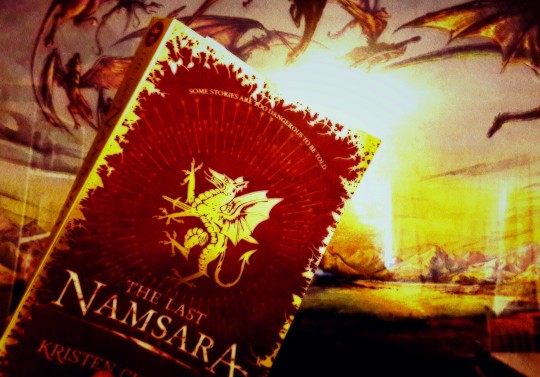
*I received an ARC from the publisher in exchange for an honest review*
To be honest, I didn’t really expect much from The Last Namsara, beyond the fact that the artwork on the stall at YALC was incredibly beautiful, and it had DRAGONS in.
So when what I ended up with was one of my favourite books of 2017, it was a pleasant surprise, to say the least.
The Last Namsara is a wonderfully lyrical book, half epic fantasy, and half fanciful fairy tale – and I mean this literally, as the book alternates between the main character’s narrative, and the retelling of the Old Stories, the myths of her kingdom. It follows Asha, a dragon slaying princess, whose past mistakes have earned her the title Iskari, after the Goddess who is associated with death and destruction. The novel starts out as her redemption story, as she plans to atone for her crimes and escape her arranged marriage by bringing her father the head of the First Dragon. But as the corruption of Firgaard is slowly revealed it becomes about Asha redeeming not just herself, but her entire country.
In a slightly different format, I’m going to recount what I loved about this book, but then go into an issue with the novel which I think needs to be disclaimed before people decided to read it. I want to be as honest and representative of it as possible.
What I loved about it:
Asha. Asha is amazingly well rounded female character, by which I mean ‘my smol angry baby’. She’s a fighter, which means she could easily fall into ‘strong female character’ territory, but while it’s fun to watch her punch things (in particular her dick of a fiancée), the story goes into much more detail than that. She's ruthless, irate, and guilt ridden, and watching the book explore the conflict between the hard, cold mask Asha tries to uphold and her own doubts, sadness, and pain, was incredibly interesting. I loved watching the way she developed over the course of the novel, having to unlearn a lot of assumptions she has made about her life and her country, and to in its place learn to place her trust in other people.
The mythology. From the initial story about Namsara and Iskari, I was hooked into the world. The power of stories and the place it holds within Firgaard is such an interesting one – from the way they got told and then retold in a new light, to the destabilising power they wield, to the fact that can be used to lure dragons, as if they hold a literal magic. I loved how enchanting the stories themselves actually were, painting a bigger, sinister picture in each localised telling, and how this was reflected in their role in the story. (I’m now going to go read aloud in a wood somewhere and see if I call a dragon).
The writing. This book is, to me, reminiscent of Uprooted, in that it has a lovely descriptive style that seems very otherworldly and almost like a folk tale. There is a lot of repetition, from the text level, to motifs that reoccur throughout, and the imagery is amazing, both deceptively simple and slightly hypnotic.
The dragon came, slithering out of the red-gold silt like the treacherous thing it was. Sand cascaded down its body, shimmering like water...while it's slitted gaze fixed on the girl who summoned it. The girl who'd tricked it with stories.
...Hell, there was very little I didn’t love about this book. The plot is a gift that just keeps on giving, going far beyond the point where I expected it to conclude, and filled with interesting concepts, from the toxicity of dragon burns to sacred flames to epic histories of heroism. The writing was arresting, and I found myself barely breathing during certain scenes. And I also really enjoyed the love story, which I felt was written beautiful, but this is now what I need to focus on – I will try to give minimal spoilers, but I think it’s something that needs to be discussed before you decide whether to read the book.
Disclaimer: The Last Namsara features a romance between a slave (Skral) and a member of the master class.
Normally, this is a big NO for me, and I recognise that this comes weighed down with a lot of problematic literary and historical baggage, particularly when written by a non-POC author. I did not know when I started reading that this would be a feature of the book, which is why I wanted to people to know before they decide whether to read it or not.
What follows is spoilers, but may help you make a decision:
Torwin and Asha are never romantically involved while Torwin is a slave. In fact, bar their first interaction, they only ever interact once Torwin has escaped slavery and is freed.
Torwin’s master is Asha’s betrothed, and he abuses both of them. I’m not going to pretend that one type of abuse undoes another, but it at least means they start out as allies, both subject to systematic oppression, and places them on a more equal footing.
Asha’s interactions with slavery are forcibly deconstructed and changed. As a member of the ruling class, and in fact one of its higher members, Asha has a lot of privilege that she is forced to unlearn. Now, no book should get a cookie for helping its protagonist learn not to be racist, but the book is very interesting in its use of point of view. From the first few chapters, it becomes clear that Asha’s country is corrupt and oppressive, even if Asha can’t see it. The fact that her weapons can only be used ‘to right wrongs’, that killing dragons is a wrong and freeing Torwin is a right according to the blades objective morality, signals from the get go that, even if Asha’s narrative focalisation does not condemn right away, the world and the book in no way sanctions what happens in Firgaard, including slavery.
In this vein, Torwin repeatedly calls out Asha’s racism and privilege. He calls out that she refuses to call him by his name. He calls out her naivety in believing that slavery can be miraculously stopped overnight. He calls her out for her deliberate distancing and dehumanisation in the first few chapters. While he may fall in love with Asha, at no point does he let her position of power go unnoticed by either party, and he deliberately deconstructs her perspective and fights her at every turn.
Extreme spoiler.
Torwin has a lot of agency in the story, moreso than Asha does, initially. He is the leader of a slave rebellion, and is instrumental in a revolution of which Asha is entirely ignorant of until it happens. Whereas Asha is quite passive in the first half of the book due to her own ignorance, Torwin actively influences her and people around her to have more of a prominent role in instigating change.
Extreme extreme spoiler.
Asha decides later in the book that all the slaves need to be freed, in order to appease the objective morality that I mention above – basically to get dragons back on their side. Obviously, this is a white saviour moment (even if the cast don’t necessarily seem to white). This is when I started to take issue with the book, and begin to feel uncomfortable. However, what I find interesting is that barely a chapter later, Torwin calls her out on it. He calls her out on using it as a tool without truly understanding the experience of slaves, and for being naïve in thinking it will fix all the Skral’s problems overnight. I like that he basically lampshades her white saviour moment, and identifies as such – and I think it shows that, while the author is exploring problematic content, they are at least trying to do it sensitively (whether they succeed or not is a judgement I will leave for own voices reviewers).
Extreme extreme extreme spoiler.
Torwin gets ‘given’ to Asha as a soulmate in the final chapter of the book, in line with the mythological workings of the world. Asha flat out refuses to accept, saying she doesn’t want that kind of power over him, that it’s unfair to do it without his consent, and that the god in question is just placing Torwin into a new form of slavery just after he has escaped another form. This shows a lot of self-awareness, both on the behalf of the character, and on the author behind her. Again, no cookie for unlearning racism, but at least by this point it makes clear that both characters will only enter a relationship as consenting equals, which is an important point to make when attempting to write a slave/master romance.
Obviously, as a white reviewer, I cannot excuse this romance and say ‘it’s fine’. I think it certainly has problematic elements that mean I’m very conscious of giving this book a positive review, and I think the final judgement should be reserved for own voices reviewers. The white saviour moment was the key action that made me extremely uncomfortable, and I’m glad that it was throughly deconstructed, and was done so in Torwin’s voice.
A large proportion of this book is amazing. I love the world and its mythology, and the dual perspective in which it is written, where you see the world as it objectively is, then as it is seen when filtered through Asha’s narrowed and privileged perspective. I like that these two perspectives are both there, and both clearly different. I also have to be honest and say that I really enjoyed it, and I think lots of people will enjoy it too.
While some problematic tropes regarding race and slavery are used, I don’t personally think they go unquestioned or without severe interrogation. But obviously, I'm not the authoritative voice on that. I think, given the trajectory of the latter half of the book, more will be done to interrogate these ideas further in the second book, and that it can be enjoyed with both the reader and author being aware that those tropes are present.
Overall Rating: 4.5/5
#book review#review#the last namsara#gollancz#booklr#fantasy#dragons#this was a difficult review to write#I hope people can understand where I'm coming from#spoilers below cut!
29 notes
·
View notes
Video
youtube
Its been a LONG time since I’v done anything regarding Anita Sarkeesian. And to be honest, I wasnt going to make a response to this. But I feel like he actually raises some interesting points that are worth discussing.
to the skeptics and anti sjw's she'sseen in all ways as a force for bad adishonest critic opportunist a scamartist and ideologue a huge dick
I guess thats fair. At this point I dont think most anti-sjws really care about her though. I will say that, I, personally never got on board with the whole idea that she was a scam artist(though I can see why some people came to that conclusion). Imo, even if its true(and I doubt it), its largely a red herring.
so what I'll call the Internet left however she was broadly understood as an all-around decent critic who was unfairly maligned harassed and abused because she was a woman who spoke about feminism and about her unfair treatment on the Internet
Since you are part of the ‘internet left’ I’ll take your word for it.
I genuinely like Anita sarkeesian I agree with lots of her points and thought she was pretty cool before I knew she was somebody who everybody hated
I’m gonna be honest: Even if I was inclined to agree with anita’s criticism(I’m not), I dont know if I would really like her as a person or say she was ‘cool.’ Her videos and public appearances to me just come across as boring and uninspired.
To be fair though, my only interaction with her has been through those videos/appearances. So its possible she’s actually really nice and funny in person.
even if I didn't like her though I still wouldn't think she deserved the ire of the public you know threats and harassment from people who hated every fiber of her being
Looking back I’m actually somewhat inclined to agree with you. Aside from the obvious that nobody deserves threats and harassment(although those were grossly exaggerated), I actually think the attention given to her was unwarranted. That said, I think most of was less hatred for Anita as a person, or even as a woman, and more concerns about her potential influence and how that might affect games(and other media) we love.
Looking back that influence turned out to be ‘basically none’ but you know what they say about hindsight.
I'm gonna be looking closely at a few people mostly Thunderfoot and sargon of akkad
I’m going to point out at this point that I’m not really that interested in defending Sargon or Thunderf00t(especially not Thunderf00t). I have my quibbles with their takes on Anita.
the first big argument that Anita sarkeesian wants to make that looking at games we can see a general tendency toward centralizing narratives of male and particularly straight male empowerment and what's more that this narrative tends to place the women of video games into some pretty weird positions women are less likely to be the protagonists of games they're more likely to be presented as sexually appealing to have their bodies put on display they're more likely to take on passive or victimized positions as damsels their to be rescued by predominantly male heroes
You cold argue that there are games that do this. I could point out loads of counter-examples of games that dont.
But, more importantly, I think, is that she doesnt really make an argument for why this is bad. And even the limited attempts she does make, you explicitly reject later in this video. In other words, we’re left with no reason to accept this as a criticism, unless we’ve bought into feminist ideology prior to clicking on Anita’s videos.
If you want to argue that these videos were meant to be specifically for a feminist audience and that its silly for non-feminists to care, I guess thats fair as far as it goes. But I dont think thats what you are getting at with this video.
not being an expert in games myself I can't really go through er work fact-checking each and everyone of those examples besides that's not really something that interests me
I guess thats fair as far as it goes. I’m actually glad you acknowledge that you dont know that much about games(unlike anita). But I think you’ll miss a lot of the criticisms of her in that case, which tended to focus on how fairly she was presenting the games she looked at(not very in most cases).
He then posts and summarizes a Thunderf00t video here, I’m only gonna respond to one point then pick up later(watch the full video for context)
Jamie's girlfriend didn't need to get beaten up we didn't need to see her panties as she was taken away
I pointed this out when I responded to Anita, but compare the amount of Marion porn, to the amount of Chung-li porn, and then tell me how much men desire weak or disempowered women(granted this isnt overly relevant to anything he said, but it was something that always bugged me about anita’s arguments).
Double Dragon might be a story about heroism in some broad sense but it's also a male power fantasy it makes you feel good because you get to play as a badass
No, it IS a story about heroism. I can agree that the game sidelines and ‘damsels’ Marion(although again I’m not sold on the idea of that being inherently a bad thing). But the fantasy isnt just about beating people up for no reason, its about being able to protect and save the people you care about. I’m seriously skeptical that Double Dragon(or most other games) would resonate as much without that aspect.
I’m skipping most of the rest of the Thunderf00t stuff, because I dont think thunderf00t made the best arguments, and dont have much desire to defend them.
here's her second and much more important position that games being like that that's a problem Anita isn't just here to make a bunch of neutral statements about what video games are like she wants to say that video games have some relationship to things like sexism misogyny the patriarchy negative and pervasive stuff she sees in our culture
And since I’m not convinced that games can cause people to become sexist or other have other negative views(and neither are you as we shall see). The only problem is that the games in question offend her feminist sensibilities.
[these youtubers] nitpick small errors in her analysis see she spoke too broadly about hitman her general observations about video games must be totally off-base
Its not just hitman. That was just one of many, many examples of her misrepresenting or deliberately using game mechanics to painting games in a worse light than reality is. Also she shows no understand of how gameplay affects player attention and focus(presumably because she doesnt know as a result of not playing them)
cultivation Theory cultivation theory is an area of research and psychology that attempts to study and demonstrate the impact that media has on people the sorts of behaviors and dispositions it cultivates and when these youtubers talk about this theory it is always to point out that the research has proven it false
Not so much that its been proven false. But that the effects shown are much more subtle than is commonly portrayed, tends to reinforce previously held beliefs rather than implanting new ones, and may not even apply to games. Liana Kerzner(funny how you dont cover her despite the fact that she got a decent amount of attention for arguing with Anita), and AydenPaladin have both discussed this extensively, so I’ll just leave links to their videos.
let's say for the sake of argument that these people are absolutely right about their science every study we've done shows that video games cause no shift in behavior or disposition our research into cultivation Theory has given us nothing but a bunch of bummed out psychologists now assuming all this let's ask a question what exactly would these findings mean to Anita sarkeesian's claim that video games can be harmful
It would mean she’s wrong. Actually she’s wrong even in the real world where cultivation is a thing, just more subtle and might not apply to games.
but to me it would mean absolutely nothing and why is that well here's one big reason I don't think that science is actually capable of disproving obvious facts about the wa ypeople work media's abilities are cultivate behaviors emotions and dispositions isn't some incidental point about it that requires further proof rather it's the entire reason why media exists in the first place
You’re conflating two very different things here. Nobody denies that media has an ‘effect’ in the sense of causing an emotional reaction or giving some new information to people. But thats a VERY different thing than saying media can alter peoples long-term attitudes, beliefs or behaviors.
I agree the former is obvious. The latter isnt. And in fact the effect media has is pretty small.
let's do a little thought experiment say a film is made that is unabashed Nazi propaganda let's call it Lubin'sLubin
You obviously dont speak German, but okay.
every moment in this film conveys an anonymous and an explicit hatred of Jews let's say that this film is so horrendously racist that nobody in society can possibly be influenced by it to become Nazis the vast majority of people watch it critically tear it apart maybe even reflect on how silly and gross Nazism is
So you’re saying this film may, unintentionally, have a net positive effect on society. Go on.
now if what's argon and Thunderfoot says is true if the only way to say a work of art is toxic is to look at its literal impact on society then we would be unable to condemn Lubin sh Lubin since the film has no tangible effect on anyone's behavior
Oh we could absolutely condemn the film, say its gross or bad or stupid or whatever. What could not do is say its harmful. Because it isnt.
everybody with a brain knows that this movie is bad politically not in a way that means we should ban it but in a way that is worthy of our scorn and disgust
Sure such a film would be disgusting. But disgust isnt harm. And to conflate the two is not only disingenuous as fuck, but potentially dangerous.
By this logic, Anita Sarkeesian’s videos are harmful, because lots of people are disgusted by them.
watching Anita sarkeesian's videos she does site cultivation Theory a few times says there's a causal relationship between video games being the way they are and people being sexist and to be honest I kinda wish she hadn't said those things
Do I even need to comment?
you can see that she means something very similar to what we described in our thought experiment we can see this whenever she talks about games it's pretty obvious
Indeed. Her main reason for condemning video games is that they offend her feminist sensibilities. So non-feminists have no reason to accept her criticism.
she didn't wait for the Double Dragon studies to come in and prove that the game causes regressive behaviors and of course she didn't do that because she doesn't have to she is a person who experienced this work of art and she's claiming here that what she saw in it
Or in other words:
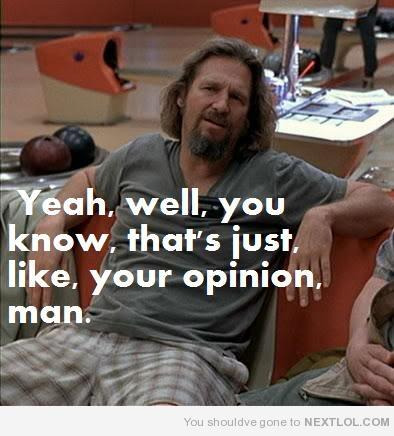
it stipulates that violence against women can be understood as erotic
Again, who is the bigger sex symbol: Marion or Bayonetta? hint: its NOT the one who is passive recipient of violence.
it just doesn't make sense to reserve our judgments of media to only those things that the work is actively calling for we also have to look at subtext and coding
And the subtext here is ‘kidnapping and beating up women is bad. And real manly badasses protect and care for the ones they love.’
keeping with our Nazi propaganda theme which I guess we have here let's use let's use this boy as an example:
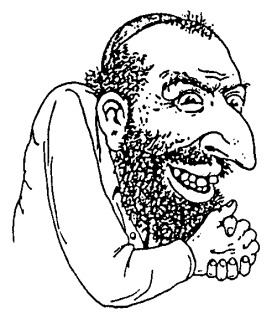
image posted for reference.
this image obviously sucks because in the society it was used in it conveyed terrible ideas it serves to implicitly justify racial hierarchy and to normalize the idea that Jewish people were subhuman it
The difference here is the image in question was used in explicit anti-semitic propaganda. There is a history here that directly links this imagery to Nazism and anti-semitism more broadly.
Video games dont have such a history. Even the tropes anita discusses that pre-date video games, such as the damsel in distress dont really have such a history. The story of Saint George and the dragon(one of the earliest DiD stories, and the oldest anita cites) was about faith and knightly duty, not gender relations. Hell Double Dragon isnt ABOUT how helpless your grlfriend, but about being the hero who is willing and capable to protect her.
Skipping some more, because I dont care:
what he[thunderf00t] seems to have forgotten is that you can buy cigarettes under capitalism and you can buy an apple under capitalism cigarettes kill 400,000 people every year but apples they don't do nearly that much damage it's actually said that they keep the doctors away you might think that cigarettes should remain legal and I'm sympathetic to that idea but you'd have a hard time convincing me that they're not harmful to the people who use them
The difference is that we have loads of evidence that cigarettes cause real, tangible harm. The same cannot be said for media. Even cultivation theory says that media tends to reinforce existing beliefs than implant new ones. And its not always clear that those beliefs translate into tangible actions.
And I’m gonna say it again before anybody brings it up: disgust is not harm.
you may think that you can talk about the worth of art from a political or moral perspective but in fact that's just a mirage anything you say about media is just an unverified and likely unsupportable position and you should probably forget about
I would phrase it differently: You can talk about media from a moral or political perspective all you want. However, anybody who doesnt share your perspective would then be perfectly justified in simply dismissing what you have to say.
hate Anita sarkeesian not because of what she says but because of who she is and the damage she causes
More precisely the damage we thought she might potentially cause. Which admittedly in hindsight was an overreaction.
they talk about how she sucks because she released her video slowly
Usually its less about her being slow, and more about she failed to keep her kickstarter promises. I dont really go in for that because because I frankly dont think its that big a deal.
didn't like being harassed on the Internet
Look, what she has shown as harassment is no worse than what most people(men and women) experience. The vast majority of it wasnt even harassment but responses and criticisms.
I guess you could say that online harassment shouldnt be a thing at all. But I also dont think thats very realistic.
talk about how she's a fraudulent grifter who gets her lackeys to phony bomb threats so she can make more money
I dont know about the bomb threat thing specifically. I DO know that she used the harassment she received(real or not) to get attention and money.
about how she's a fake gamer and so she shouldn't be talking about games
Thats a perfectly valid criticism though. Media criticism is best done by people who actually have knowledge of the media in question.
these guys are unapologetically anti-feminist and because of that they see no reason to change media to make it more feminist
So you DO get it!
and they don't criticize and Anita sarkeesian's work because of cultivation theory I mean where are the studies that show that these videos are causing murder rates to increase
I honestly dont know what you’re getting at here. The only reason anybody ever brought up cultivation theory is because Anita did first.
And they dont criticize Anita Sarkeesian's work because she explicitly calls for immoral actions
Nobody said she did? Although I think if you read between the lines she has some really negative views towards men.
and they don't criticize Anita sarkeesian's videos because they exist outside some benevolent capitalist structure I've got some hot news for you Anita sarkeesian's work is actually facilitated by capitalism
I’m not sure what you’re getting at here. But it does make Anita a massive fucking hypocrite.
no they hate Anita sarkeesian's work mostly because she says stuff they think is bad she's a feminist who wants various things about games to change and they disagree with her vehemently about it
And more importantly, that with all the attention she was getting at the time we thought the kind of changes she wants might actually start to happen. Not that her videos would turn game developers into feminists(because lets face it, theres basically zero chance of her videos turning anybody feminist). But because they might become convinced that there is an audience for the kind of games she wants.
Like I said multiple times: We were mostly mistaken about that.
Theres not really much else here. he just repeats himself. so thats all for now.
0 notes
Photo

#7 Is there anything you used to like but can’t stand now?*
Caitlin Snow. I started out being okay with her. Liked her season one but her writing has gotten worst and worse and I started to like her less and less. I’ve never been a big DP as I did not care for in Shark a tv show from 2006 but that didn’t make dislike Caitlin back in season one it just made me not love her. Caitlin got the short end of the stick in season two due to being reduced to a love interest and it only got worse. Her behavior in season three is a point of no return. Crappy writing turned to #%@# writing. Her selfish actions and lack caring about Iris’s impending death was too much for me before her actions as Killer Frost. The selfish could’ve been a really good story to go with the Killer Frost plot but the Killer Frost plot was a mess of blame of the evil meta-human powers. The ‘other personality’ felt like a cheap scapegoat and the badly mishandled storyline. By the time Caitlin trying to murder Cisco without hesitation I was just done completely done. When she hit the third murder attempt on Cisco, that only failed because Cindy psychically blocked it, and had dragged, who she thought was Iris, but really HR, to their death - I was completely over her character. The sudden switch back to the good guy’s side when Savitar was going to Cisco felt so HOLLOW. It made zero sense unless you look at it as she was motivated by self-interest. Because she just realized Cisco was right about picking the wrong side, realized Cisco was the better side, realized her side was losing since Savitar was going to stop existing soon. She ended the season as not Caitlin & not Killer Frost. The story is such mess all I can make of it has she had a choice of who be and what to and she chooses selfish which lead to murdering her best friend and that never woke her up. Meaning Cisco isn’t that important to her. Obviously, Iris means nothing to her. HR? something to feel a little sad about but not something to say I should turn myself in to go to jail to be punished for this terrible wrong I’ve done. (Thinking of John Diggle feeling so guilt over having to kill his brother that he was willing to go to jail on crime he framed for because he felt like he needed to be punished for his crime)
#9 Most disliked character(s)? Why?
Mon-el is a slave owning, misogynistic, selfish, lying, the asshole who took over Supergirl and draged down everything he touched. The damage he has done to Supergirl is immense and I don’t know if the show can really get over it. It has to make serious changed to get over the damage he caused. He the anti-Supergirl! The fact that he took up so much screen time, stole SG’s spotlight, pushed out important characters like James Olsen off the screen, pushed out important relationships off to the side,and is just based in so much racist in just the way he entered the show and existed on top of ‘SG has to teach him to be a good person’ with fact that he could never learn to respect her even been told simply how to do again and again…I just don’t have enough words for how truly awful he is. He is the anti-Supergirl in every way. Sometimes I still can’t believe he happened to the show.
Facility Smoak simply put she’s terrible, gets too much focus, is given too much importance, is way over powered and has to have others depowered to make her overpowered. She selflish, annoying, abusive, she’s the embodiment of fake feminism and misogynistic writing. I think Felicity is part of what destroyed Arrow.
#11 Is there an unpopular character you like that the fandom doesn’t? Why?
I like HR but don’t stan him. I’m middle ground HR and people either HATE him or LOVE him. I had issues with HR but so I’m a general middle level of ‘like’ not love or hate. I see both sides but don’t go for either so does that count? Sometimes I feel like I can’t share an opinion with some people who I like chatting with because they feel so strongly for the pro or anti side and I’m too middle ground for them. I either sound too anti or too pro for their taste so I don’t engage.
1 note
·
View note
Text
International Communication
In this post I will analyse the social media platform Twitter as a form of international communication. The reason I have chosen Twitter is because it is actively used by 336 million people worldwide (Statista, 2018), and it is often used to communicate with people all over the world.
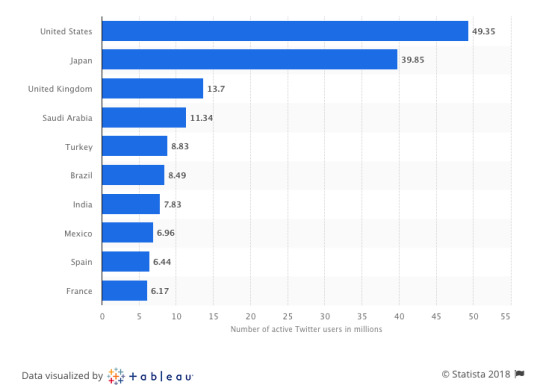
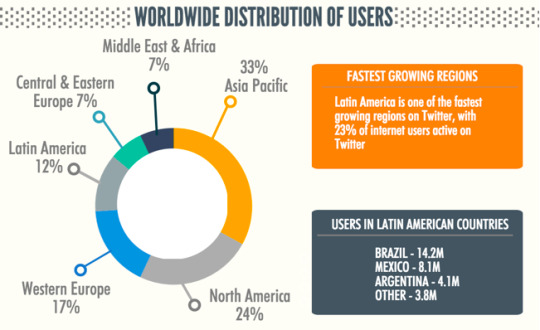
Twitter is an interesting form of international communication as, even though it is primarily text based, it can be used to share videos and images. Twitter is used by many people, and these days most businesses have a Twitter in order to stay current, as this site is often used to express concerns about companies by the public. The whole idea of Twitter is to express your thoughts and ideas, making it a popular site for teenagers and young adults. In fact, in the U.S., 40% of all Twitter users are aged 18-29. According to Boyarsky (2015), there are 500 million tweets sent per day, further showing the popularity of the site. Also, Twitter supports 33 different languages, making it easily accessible to a global audience.
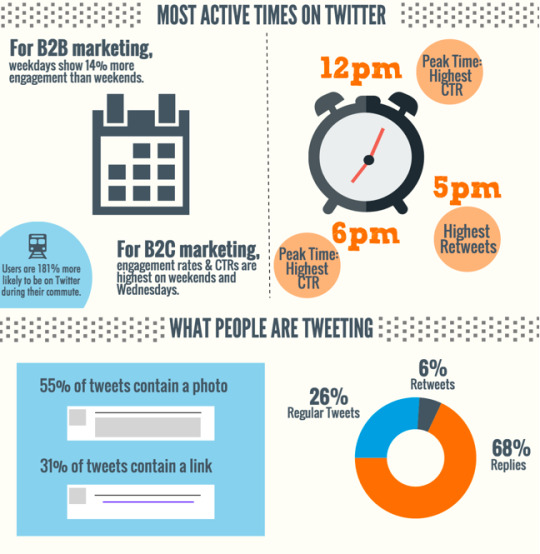
This image exemplifies what people are using Twitter for, and when they are using it. The fact that 68% of all tweets are replies shows that people are mainly using the site to communicate with one another.
Twitter also has the ‘trending’ feature, which allows users to see what is being talked about most worldwide on Twitter. This shows how media has become global as this feature (and the ability to search through news feeds) allows people from all around the world to find out information that they may previously not have had access to. For example, local news stories may not have made national news, however they often get featured on Twitter, therefore allowing certain cultures to gain more recognition.
This creates a global media culture, as many people are accessing the same information and therefore people are beginning to have the same beliefs and ideals.
On a broader scale, the ability to access news from all over the world on Twitter is important in building this global media culture, as it allows for lots of people to recognise what people worldwide are experiencing.
For example, many people took to Twitter to document the uprisings in the Middle East and North Africa as many felt as if national news channels were not covering these issues. Allen (2009, pp.9-12) notes that ‘citizen journalism has proved to be creatively adept at putting to work the now constantly updating and superseding communication technologies that have become widely available’. This shows how, because of social media sites like Twitter, the world is becoming more and more interconnected. People no longer just want to hear about what is happening in their country, they want to know what’s happening worldwide. And Twitter is the perfect place to obtain this information. This is further enforced by this quote from Gerret von Nordheim (2018, pp.548-569), which suggests that social media is becoming a prominent news outlet: ‘Twitter is an important social network for news “favoured by journalists, politicians, and heavy news users in particular”’.
Communicating through Twitter as a whole is a large part of building a global media culture, as without links to other countries and information about different cultures and people’s beliefs and ideals, then we wouldn’t be able to sustain this culture. Without social media sites in general it would be much more difficult to have a global media culture as many national news channels don't focus on global issues, they mainly focus on local ones.
However, there are obviously some drawbacks to Twitter. Since anyone can create an account for free, disrespectful people can quite easily make an account and start tweeting abusive things.
This article: https://thenextweb.com/syndication/2018/11/22/hate-speech-too-easy-to-find-on-social-media/ shows how hate speech is still a fairly big thing on Twitter, despite their policies.
If people are tweeting abusive, racist things and being disrespectful online, then the global media culture becomes fragmented because of these people and their harmful beliefs.
Many argue that all social media sites are becoming the same, and I believe that in the future all of the most popular sites will be nearly identical.
Snapchat was the first social media to incorporate ‘stories’, however now nearly all social media sites have them. Twitter was the first for hashtags, however now they are used across all social media, and so on. I believe the future of international communication will show us being hugely interconnected, mainly by these sites, however I believe the content will be the same across all of them.
References
ALLAN, S. and THORSEN, E., 2009. Citizen Journalism: Global Perspectives. New York: Peter Lang Publishing
BEAUMONT, P., 2011, The Truth about Twitter, Facebook and the uprisings in the Arab world.Available: https://www.theguardian.com/world/2011/feb/25/twitter-facebook-uprisings-arab-libya [Accessed: Nov 22, 2018].
BOYARSKY, K., 2015, How Do People Use Twitter?Available at: https://blog.hubspot.com/marketing/twitter-usage-stats [Accessed: Nov 22, 2018].
GRYGIEL, J., 2018. Hate speech is still too easy to find on Twitter.Available at: https://thenextweb.com/syndication/2018/11/22/hate-speech-too-easy-to-find-on-social-media/ [Accessed: Nov 22, 2018].
STATISTA, 2018. Countries With Most Twitter Users 2018, Available at : https://www.statista.com/statistics/242606/number-of-active-twitter-users-in-selected-countries/ [Accessed: Nov 22, 2018].
STATISTA, 2018. Twitter MAU in the United States.Available at: https://www.statista.com/statistics/274564/monthly-active-twitter-users-in-the-united-states/ [Accessed: Nov 22, 2018].
TIEN, S., 2018, Top Twitter Demographics That Matter to Social Media Marketers.Available at: https://blog.hootsuite.com/twitter-demographics/ [Accessed: Nov 22, 2018].
VON NORDHEIM, G., BOCZEK, K., KOPPERS, L. and ERDMANN, E., 2018. Reuniting a Divided Public?
Tracing the TTIP Debate on Twitter and in Traditional Media; International Journal of Communication, (Volume 12), pp. 548-569
0 notes